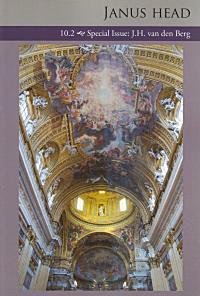 Janus Head Janus Head
10.2
Special Issue
J.H. van den Berg

Travels Inside the Archive
Robert Gibbons
Edge of Maine Editions

Beyond Time
New & Selected Work
1977 - 2007
Robert Gibbons
 The Age of Briggs & Stratton The Age of Briggs & Stratton
Peter Culley
|
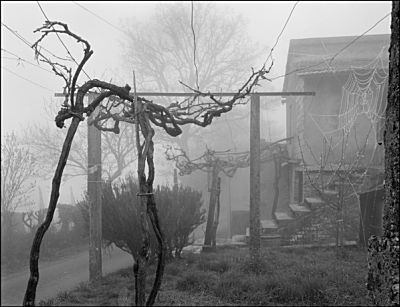
In The Garden
Photographs by Joel Leivick
Scott Nichols Gallery
_______________________
Champdieu
Bernard Noël
the proportions at times prompt the sky to think
the garden therefore is in the open head
to look is to see the interior view
the long fold stirs according to the hidden
which comes to the edge of form a white shadow
the boxwood knows that better than us it builds
by ardor of the line springboards for the eye
the infinite sets itself thus within reach
the tree is always of life or of knowledge
from the moment where the sap of breath appears
it isn’t important to have a green thumb
but to be able to bring through the branches
this flowering of air that we call being
Three Poems from The Rest of the Voyage
Bernard Noël
translated from the French by Eléna Rivera
conjunctions
_______________________
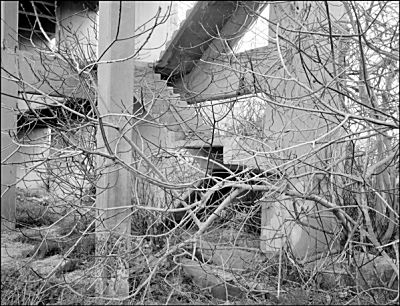
Below Tarquinia
Joel Leivick
_______________________
On Packing
Herta Müller
Translated from the German by Donal McLaughlin
words without borders
Everything I have I carry with me.
Or: everything that's mine I carry on me.
I carried everything I had. It wasn't actually mine. It was either intended for a different purpose or somebody else's. The pigskin suitcase was a gramophone box. The jacket was from my father. The town coat with the velvet neckband from my grandfather. The breeches from my Uncle Edwin. The leather puttees from our neighbor, Herr Carp. The green gloves from my Auntie Fini. Only the claret silk scarf and the toilet bag were mine, gifts from recent Christmases.
The war was still on in January 1945. Shocked that, in the depths of winter, I was to be taken who-knows-where by the Russians, everyone wanted to give me something that would be useful, maybe, even if it didn't help. Because nothing on earth could help. It was irrevocable: I was on the Russians' list, so everyone gave me something—and drew their own conclusions as they did. I took the things and, at the age of seventeen, drew my own conclusion: the timing was right for going away. I could have done without the list being the reason, but if things didn't turn out too badly, it would even be good for me. I wanted away from this thimble of a town, where all the stones had eyes. I wasn't so much afraid as secretly impatient. And I had a bad conscience because the list that caused my relatives such anguish was, for me, tolerable. They feared that in another country something might happen to me. I wanted to go to a place that did not know me.(....)The laces on the bocanci were tied now. I sat down at the table and waited for midnight. And midnight came, but the patrol was late. Three hours would pass-which was almost intolerable. Then they were there. My mother held the coat with the velvet neckband up for me. I slipped my arms in. She was crying. I put on the green gloves. In the wooden passageway-right where the gas meter is-my grandmother said: I know you'll return.
I didn’t mean to remember this sentence. I took it with me into the camp, without thinking. I had no idea it was accompanying me. But a sentence like that is independent. It worked in me, more than all the books I took with me. I know you'll return became my heart-shaped shovel’s accomplice, and the angel of hunger’s adversary. Because I did return, I have the right to say: a sentence like that keeps you alive....(more)
_______________________

Sarah Kofman
(September 14, 1934 – October 15, 1994)
For she too was without pity, if not without mercy, in the end, for both Nietzsche and Freud, whom she knew and whose bodies of work she had read inside and out. Like no one else in this century, I dare say. She loved them pitilessly, and was implacable towards them (not to mention a few others) at the very moment when, giving them without mercy all that she could, and all that she had, she was inheriting from them and was keeping watch over what they had—what they still have—to tell us, especially regarding art and laughter.
- Jacques Derrida, The Work of Mourning
Rue Ordener, Rue Labat
Sarah Kofman
translated by Ann Smock google books
Nietzsche and metaphor
Sarah Kofman
translated by Duncan Large
google books
Camera obscura: of ideology
Sarah Kofman
translated by Will Straw
google books
Smothered words
Sarah Kofman
translated by Madeleine Dobie
edited by Penelope Deutscher, Kelly Oliver
google books
.....................................................
Sarah Kofman : Effecting Self Translation
Christie McDonald
Enigmas: essays on Sarah Kofman
edited by Penelope Deutscher, Kelly Oliver
google books
Love Without Pity
Michael Roth
bookforum
Sarah Kofman had something to say, about philosophy, about psychoanalysis, about art, about women. She found her voice in the 1960s, and the language she came to speak was deferred and delivered—articulated—through the lexicon of her generation. It was a time that prized radicalism of thought and often of deed. Impetuousness was rewarded; extravagance in interpretation became an odd norm. Some of the writing from this period, and some of its dramatic political gestures, now look like mere antics; the invitation to easy irony was a slippery slope and could easily be co-opted by commercial culture. And it was.
But Kofman had something to say, and her writings still command attention for their insight, their adventurousness, and their attentiveness to the philosophical traditions with which she so productively wrestled. She was one of the great readers of Freud in the twentieth century, and she brought the same caring intelligence to her interpretations of Nietzsche. In his memorial address for Kofman (reproduced as the introduction to this volume), Jacques Derrida called her love for these thinkers “pitiless,” by which I think he meant that she gave herself to them, and tried to find what they had to offer, without restraint....(more)
Bodily detours: Sarah Kofman's narratives of childhood traumaKathryn Robson Modern Language Review, July, 2004Sarah Kofman's corpus
edited by Tina Chanter, Pleshette DeArmitt
google books
_______________________
 View of Matera
Joel Leivick
_______________________
Hinchas
"... a digital codex of modern, American writing. As such, it publishes the fiction, poetry, and prose of authors from the Americas. When we say "Americas," we mean it in the way that José Martí did--namely, that the word "Americas" encapsulate the whole of the Americas, not just the North. Thus, we seek to big-up Pan-Americans, and the works they are currently creating."
via NewPages

photo - mw
_______________________
Sheep
Jane Hirshfield
It is the work of feeling
to undo expectation.
A black-faced sheep
looks back at you as you pass
and your heart is startled
as if by the shadow
of someone once loved.
Neither comforted by this
nor made lonely.
Only remembering
that the self in exile remains the self,
as a bell unstruck for years is still a bell.
Jane Hirshfield poemsDrunken Boat 10 - Spring 2009
Poetics
Of gravity & angels
Jane Hirshfield google books
Some Place Not Yet Known
an interview with Jane Hirshfield
atlantic
Part of poetry's core activity, both within an individual and within a culture, is to attend to and make visible what Jung called the shadow life. Whatever it is that isn't being sufficiently attended to, poetry will be magnetically drawn toward.
When I began writing one of the essays in Nine Gates, "Poetry and the Mind of Indirection," I thought how odd it is that poetry seems to be a way of thinking circuitously; instead of simply saying "I'm sad," a poem describes rainfall or the droop of a branch. I thought this was a secondary way of thinking, almost the reverse of the direct knowledge of experience a person seeks in Zen meditation. But when I looked into it more deeply I found that traveling by language from self into the world is also a primary way humans understand experience. Language discovers and creates itself through metaphor, and through that process external and internal words reveal their interconnection. Metaphor isn't embellishment; its way of thinking came first and abstract thought arose later, along with literacy. And so what may appear to be indirection is in fact a fundamental way that we human beings understand our lives -- through language that emerges from the body, from the tastes and sensations and movements and gestures of our own bodies and from the body of the earth all around us. In poetry, as in Zen practice, experience comes first. My job as a human being as well as a writer is to feel as thoroughly as possible the experience that I am part of, and then press it a little further. To find out what happens if I ask, "What else, what next, what more, what deeper, what hidden?" And to keep pressing into that endless realm, in many different ways.
(....)
I'm not sure myself that the metaphor of translation is entirely accurate for the relationship between experience and the poem that seems to come out of that experience. Literally, translation means "carrying over," but it seems to me the relationship between life and language isn't a carrying over but a further creation -- a making of more life through words. Sensation, awareness, emotion, can all exist in beings without language, but complex human consciousness is a worded consciousness, to such a great degree that we often have to work hard to rediscover the immediate life of the body, of the visual imagination, of the senses. Poetry, of course, is a verbal realm in which that sense-born world is of the essence. It is a place of interconnection, where mind and body, self and other, inner and outer, may meet. And so I see poetry not as an attempt to accurately depict an experience already known but as the making of a new experience that presses into some place not yet known. I write poems when I am perplexed, aroused, suffering, curious, uncentered. The poem tries to answer that puzzlement, to expand the boundary of what I can know and understand; in that extended understanding what was shimmering at the periphery can now come into the core. A good poem is a bit like a volcanic island. It creates new terrain of the soul. ...(more)
Jane Hirshfield Interview MiPO 2005.....................................................
Waking the Morning Dreamless After Long Sleep
Jane Hirshfield
But with the sentence: "Use your failures for paper." Meaning, I understood, the backs of failed poems, but also my life. Whose far side I begin now to enter— A book imprinted without seeming season, each blank day bearing on its reverse, in random order, the mad-set type of another. December 12, 1960. April 4, 1981. 13th of August, 1974— Certain words bleed through to the unwritten pages. To call this memory offers no solace. "Even in sleep, the heavy millstones turning." I do not know where the words come from, what the millstones, where the turning may lead. I, a woman forty-five, beginning to gray at the temples, putting pages of ruined paper into a basket, pulling them out again.
_______________________
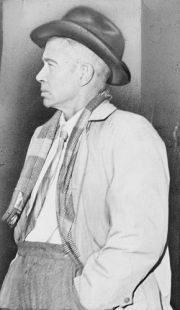 E. E. Cummings
Oct 14, 1894 – Sept 3, 1962
photo: Walter Albertin for New York World Telegram
all which isn't singing is mere talking
and all talking's talking to oneself
(whether that oneself be sought or seeking
master or disciple sheep or wolf)
gush to it as diety or devil
-toss in sobs and reasons threats and smiles
name it cruel fair or blessed evil-
it is you (ne i)nobody else
drive dumb mankind dizzy with haranguing
-you are deafened every mother's son-
all is merely talk which isn't singing
and all talking's to oneself alone
but the very song of(as mountains
feel and lovers)singing is silence
- E. E. Cummings
_______________________
Losing the News: The Future of the News That Feeds Democracy
Alex S. Jones, Joanne J. Myers
The top 10 stories not brought to you by mainstream news media in 2008 and 2009
Rebecca Bowe
_______________________
why must itself up every of a park
anus stick some quote statue unquote to
prove that a hero equals any jerk
who was afraid to dare to answer "no"?
quote citizens unquote might otherwise
forget(to err is human;to forgive
divine)that if the quote state unquote says
"kill" killing is an act of christian love.
"Nothing" in 1944 AD
"can stand against the argument of mil
itary necessity"(generalissimo e)
and echo answers "there is no appeal
from reason"(freud)--you pays your money and
you doesn't take your choice.Ain't freedom grand
- E. E. Cummings
_______________________

photo - mw
_______________________
as freedom is a breakfastfood
or truth can live with right and wrong
or molehills are from mountains made
-long enough and just so long
will being pay the rent of seem
and genius please the talentgang
and water most encourage flame
as hatracks into peachtrees grow
or hopes dance best on bald men's hair
and every finger is a toe
and any courage is a fear
-long enough and just so long
will the impure think all things pure
and hornets wail by children stung
or as the seeing are the blind
and robins never welcome spring
nor flatfolk prove their world is round
nor dingsters die at break of dong
and common's rare and millstones float
-long enough and just so long
tomorrow will not be too late
worms are the words but joy's the voice
down shall go which and up come who
breasts will be breasts and thighs will be thighs
deeds cannot dream what dreams can do
-time is a tree (this life one leaf)
but love is the sky and i am for you
just so long and long enough
- E. E. Cummings
_______________________
I don’t like Photography
Bert Stabler
Proximity Magazine
From Walker Evans and Dorothea Lange to Diane Arbus and Richard Avedon, to contemporary work by Paul Graham, Nan Goldin, Jesse Kotler, and Chris Verene, there may be some mumbled apologia, but the assumption is that we are ennobled by the images of people whose bondage and suffering ultimately undergirds our liberty and comfort – and whose misery deeply fascinates us. “Poverty” describes a voyeuristic urge to claim that the same authenticity that is projected on to the anguish of a suffering face applies reciprocally to the image, its maker, and its viewer. Of course images of injustice and struggle have been a direct call to action, but this is usually not art, as such, but widely reproduced photojournalism – fraught with ideological baggage all the same, but generally the macro-politics of policy outweigh the micro-politics of viewership. But then again, the ideological role of documentary photography’s nuanced and special moments has been considerable in the soft borderless colonialism of the postwar years. Whether appearing in Life, National Geographic, or Harper’s, this intrusive intimacy and false familiarity needs to be challenged at the intuitive level at which it operates, which has been happening in recent work by Alfredo Jaar and Renzo Martens. For the most part, however, we are treated to an endless minstrel parade of homeless veterans, junkie drag queens, sideshow refugees, depressed suburban loners, trailer-park residents, and various other contemporary mutants deemed undeserving of dignity.(....)
Photography is unique. It is not like other art, because there is no step away from mimesis. The image is not made of something clearly artificial, like paint, clay, or even collage. There is no embodiment. The print or screen quality is merely a certain kind of window. And, unlike the analogous media of film and video, there is no time, and thus no sense of the third party – the camera and the subjects being part of a distinct event, whether explicitly contrived or not. What photography then offers is a pure presence, a mirror that shows us what Lacan contends is at stake when we develop in early childhood a sense of our own objective existence, by not just (mis)recognizing oneself in the mirror, but wanting oneself. The visual aspect of the psyche gets its own name from Lacan– the Imaginary– and it is, coincidentally, the area where our bottomless pit of desire may be found. This is an area that photography has access to, without disturbing either our sense of what we know (the Symbolic) and what we cannot know (the Real). The Imaginary is part of language, but not precisely rational – it contains the image of the chair we think of when we use the word ”chair,” but not the word itself. This is why there is no question of truth in photography. This can make it seem problematic, and apparently pointless – also a problem of fine art itself, thus enforcing the aforementioned discipline of rigidity. And, as with Foucault’s sciencia sexualis, the pleasure that comes with observation is a pleasure in control, so we will never tire of dissecting and reconstructing the abyss of the desired object in all her glorious minutiae....(more)
via Jörg Colberg
_______________________
all ignorance toboggans into know
and trudges up to ignorance again:
but winter's not forever,even snow
melts;and if spring should spoil the game,what then?
all history's a winter sport or three:
but were it five,i'd still insist that all
history is too small for even me;
for me and you,exceedingly too small.
Swoop(shrill collective myth)into thy grave
merely to toil the scale to shrillerness
per every madge and mabel dick and dave
--tomorrow is our permanent address
and there they'll scarcely find us(if they do,
we'll move away still further:into now
- E. E. Cummings

Hadrian's Library
Athens
James Robertson
1854
salted paper print from wet collodion negative
Early Photography in Greece and the Mediterranean
getty
_______________________
Zones of a Non-Linear Discourse on the Red Seal
Robert Kelly
(....)
3.
caves of the Dordogne and the Pyrenees
are topological extensions of our minds
brains calvaria
where we find scratched on the wall
ONLY what we are prepared to read
The decipherments of rock scratches
Sobin, Eshleman et al.
4.
read the impressions on the mind
read the fissures folds
for the brain also is a process of creases and folds
cerebral cortex cork rind of our tree
to write on bark
beech bark smooth beech = Buche = buch
5.
to make the mind disgorge
its buried darknesses
to make the dark speak
without trying to turn it
into the presumptuous light
like honoring the dream
by dreaming it
by carrying it around by day
by reading/re-reading it
not by interpretation
but by dwelling with
because reading a book is dreaming someone else’s
I mean to enter the caves -- whether Lascaux or language -- and come out with a decent dark thing, a word or poem,
That does not presume to interpret what was found down in there
But is itself the fruit of that sweet encounter with the, in the, dark.
Anthrôpos pantôn metron said the Greeks,
The human is the measure/means of all things,
What was carved on the rock wall
Speaks in us now.
...(more)
_______________________

Outpost library
University Settlement, Peter Street
c. 1918
Playing By the Rules
Organized Children's Leisure In Toronto
1897-1934
City of Toronto Archives
_______________________
Fractal learning
Teemu Arina
So what do fractals have to do with learning?
When considering learning, we are pattern recognizers. Just like fractals, our neural networks evolve over time and extend outside of us. As our environment changes, so do we. As we process information, in addition to entropy, new patterns emerge. By increasing the ammount of information, you increase the possibility of new patterns to be recognized by people.
In the digital world, entropy is information overload and order is the pattern that emerges from the interconnection of such information.
Knowledge is like a hologram. In holograms, even smaller pieces of it include the picture of the whole object. Knowledge is like a hologram. The experience changes as your point of view towards the object changes. The knowledge is not in a single image, but distributed on a network.
This is pattern recognition. And it's the culmination of fractal learning. It's a Mandelbrot set that zooms into the details indefinitely. Universe is fractal by nature. So is learning fractal by nature. It's rough, it's self-similar, it's recursive and increasing the likelihood for serendipity is key for building higher structures....(more)
via Stephen Downes
_______________________
Lenny Bruce had an incurable disease. He saw through the pretense, hypocrisy, and paradoxes of our society. All he insisted on was that we meet it straight ahead and not cop out or lie about it. "If something about the human body disgusts you," he said, "complain to the manufacturer." He was one of those who, in Hebbel's expression, "have disturbed the world's sleep." And he could not be forgiven .
-
Ralph J. Gleason
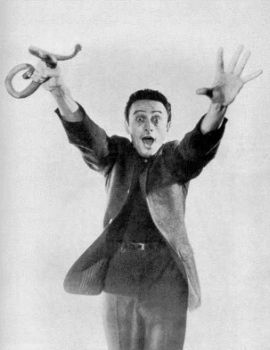
Lenny Bruce
(October 13, 1925 – August 3, 1966)
Lenny Bruce is dead but he didn't commit any crime
He just had the insight to rip off the lid before its time.
-
Bob Dylan
_______________________
Algebra of Identity
Skin of Wind, Skin of Streams, Skin of Shadows, Skin of Vapor
D. Fox Harrell
ctheory
The subtitle of this paper: Skin of Wind, Skin of Streams, Skin of Shadows, Skin of Vapor is meant to evoke a restricted notion of identity, and the insubstantiality of that notion. A focus on skin is obsessive and solipsistic. I am expected to write about it in a paper on identity. When ethnic identity is made binary and colorized, we talk in bodily terms, of skin. It is evocative -- it is a membrane, protecting, projecting, coating, an exterior, a superficial, obvious and immense organ. I shan't disappoint these expectations of skin obsession, but when I write of the traits of ethnic identification these are just symbols for a classification based conception of social identity.
Wind whips, shrieks, or is unnoticeable. Streams bears small creatures below rocks, rush with energy and transparency. Shadow obscures, cools, relaxes. Vapor moistens, hides, causes ships to crash, is fluid but hangs in the ether. If we can imagine these four skins, we can also imagine skin of tangled roots, illicit love, unscratched itches, crossed senses, angels, or demons. I shall get back to this later.
What I wish to conjure is a sense of the fleeting nature and contingency of classification based identity as it is typically conceived of. I propose why some current notions of identity seem damaging, and discuss alternative ways to address it. My belief is in internalizing and exposing this very contingency, accepting this as the reality in how we perceive ourselves, others, and the concept of identity as a whole. ...(more)
_______________________
 spring fed well
Heidegger's study
window beyond
(Copyright Digne Meller-Marcovicz)
Heidegger's Hut
Adam Sharr
including photographs by Digne Meller-Marcovicz (1968)
pdf here
free reg. req.
from the prologue
Heidegger’s actual hut at Todtnauberg is as much a philosophical event as it is an architectural one. Opened up in both instances are sites of activity. The activity in question centers on the question of how “place” is to be understood. With place there arises the complex relationship not just between philosophy and geography but also, and just as acutely, between geography and creativity. Even though when first posed it appears to be a simplistic question, nonetheless it is possible to ask what type of relationship exists between geography—understood as the place of writing—and that act which brings writing and thinking together. This is not an act in any abstract sense. Rather it is one with a particular orientation, if not mode of expression. It is possible to suggest, for example—even if the prompt guiding such a suggestion would need to be questioned— that the setting of Delphi in Greece, its actual physical position, with the siting of the Temple of Apollo on the side of Mount Parnassus, adds more force to the Heraclitean fragment that begins with the evocation of the Delphic oracle.1 Would such a positioning have exhibited any hold if the oracle were to have been found in a back street in Piraeus? No matter how amusing such a suggestion may be—and it could even be precisely because it is amusing—what it gestures toward is a type of truth. Namely, the apparent implausibility of the oracle being so located already suggests that there is a type of relationship between place and forms of thought. Place, once given a more precise delimitation, needs to be defined in terms of specific positions.

Heidegger lacing his boots
(Copyright Digne Meller-Marcovicz)
_______________________
The secret centre: Blanchot and The Turn of the Screw
Stephen Mitchelmore
Blanchot asks: "Why this joy, this passion, this feeling of a wonderful life, which [James] cannot evoke without tears, to the point that his notebooks, "the patient, passionate little notebook becomes ... the essential part of my life"?".
This question and Blanchot's answer stirs me because I have noticed with surprise how much enjoyment I take in making notes; how much more, that is, than in the actual production of a work. Against initial assumptions, I sensed it is too easy to dismiss this as an eternal delay of the real thing or as the unobtainable carrot of perfection, but have never really appreciated why. We all know about Bruce Chatwin's attachment to his Moleskine notebooks, and how he offered a reward to anyone who could return one lost, but this reliance on the information contained within is something other than that addressed by Blanchot. The essay is so rich that it is difficult not to quote from every page, so this will be the betrayal of even a potted summary. In mitigation, the essay itself offers a good summary of the essence of Blanchot's form of engaged reading; a reading that does not lead to or from any theory.
The Turn of the Screw
in
The Book to Come
Maurice Blanchot translated by Charlotte Mandell google books
available at the Book Depository
_______________________
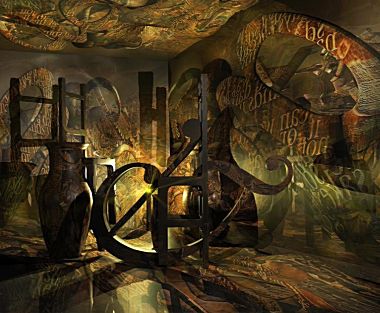
Lost poem redux
three visual poems
Peter Ciccariello
ekleksographia Peter Ciccariello maintains Invisible Notes
.....................................................
Ekleksographia Wave Two: The Translation Special
edited by Anny Ballardini
.....................................................
from They were in Danger by Marco Giovenale
translated by Linh Dinh
[text in progress]
ekleksographia
11.
Yes, like you told me, I refused to listen to music, because of the dust. On the record, yes. I didn't even read, not even a letter, for the same reason, just as stated. Stayed in my hiding place the entire time. I tried not to learn anything. Tried to simplify to the utmost my words. At any moment simplicity was even stronger than reality. I thought I was betraying it. It was full of specks. No one could verify what I said. When it was transcribed by the reporters the most celebrated phrase, relative to love, many of them didn't understand the objective. Even if I simplified everything, at the risk of lying, not everything was clear to them. Nearly nothing, really. Now as I cross entirely into deception, I'm thinking: now it will be clear, explicit. I'll always lie, completely, without rhetoric. Plainly. Everything will be deciphered. They'll want it that way. They'll understand me because it's also their language. With all the syntax reduced to zero, totally simplified. They understand the lies, the distortions. They'll read. It will be clear. I was wrong. It didn't even work like that. It wasn't working....(more)
.....................................................
The Lament of the Soldier's Wife:
Variations on the Ching Phu Ngam
Joseph Duemer
ekleksographia
War always. War by policy.
A bad time for women. The death of children.
Braying horns. Martial drumming.
The valleys full of moving armies.
The naked face of heaven looks down
on the signal fires along the frontier
& though the moonlight may seem to tremble
Heaven does not answer.
...(more)
_______________________
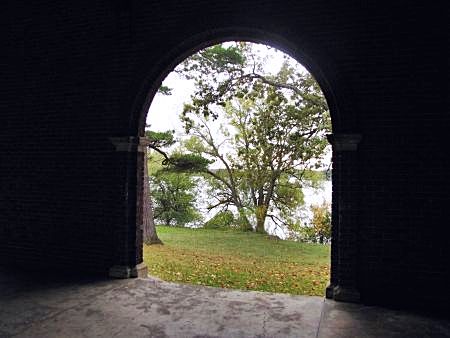
photo - mw
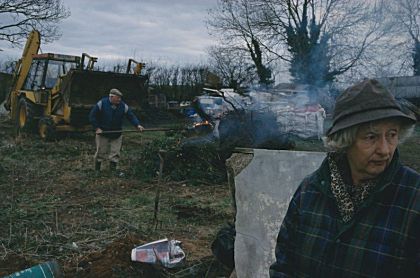
The East Anglians
Justin Partyka
via Anne Galloway at Space and Culture .....................................................
“Central to an agrarian culture is the idea of land: not just working the land, living on the land, and owning the land (all which are important) – but that much deeper concept of being part of the land; the process of it becoming both physically and psychologically engrained in the human experience. It is impossible to escape the presence of the landscape. It creeps from the fields into the home. It enters through an open window, or a crack under the door; engrained in the palm of a hand, or on the sole of a boot. Leeks sprout from the curtains and the table top is fenland peat. The agrarian farmers I have come to know are so deeply rooted to the land, it is as if they have grown up out of the soil like a tree. Such an intimate relationship comes from what the rural writer, farmer and activist Wendell Berry, describes as “knowledge in place for a long time.”
- Justin Partyka
.....................................................
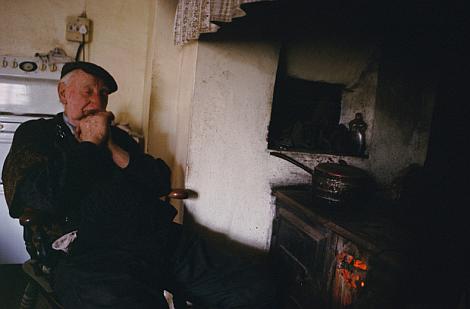
Justin Partyka
_______________________
Deleuze on Assemblages
courtesy of Larval Subjects
In assemblages you you find states of things, bodies, various combinations of bodies, hodgepodges; but you also find utterances, modes of expression, and whole regimes of signs. The relations between the two are pretty complex. For example, a society is defined not by productive forces and ideology, but by “hodgepodges” and “verdicts.” Hodgepodges are combinations of interpenetrating bodies. These combinations are well-known and accepted (incest, for example, is a forbidden combination). Verdicts are collective utterances, that is, instantaneous and incorporeal transformations which have currency in a society (for example, “from now on you are no longer a child”…).
There are two ways to supress or attenuate the distinction between nature and culture. The first is to liken animal behavior to human behavior (Lorenz tried it, with disquieting political implications). But what we are saying is that the idea of assemblages can replace the idea of behavior, and thus with respect to the idea of assemblage, the nature-culture distinction no longer matters. In a certain way, behavior is still a countour. But an assemblage is first and foremost what keeps very heterogeneous elements together: e.g. a sound, a gesture, a position, etc., both natural and artificial elements. The problem is one of “consistency” or “coherence,” and it prior to the problem of behavior. How do things take on consistency? How do they cohere? Even among very different things, an intensive continuity can be found. We have borrowed the word “plateau” from Bateson precisely to designate these zones of intensive continuity. (Two Regimes of Madness, pgs. 176 – 179)...(more)
Two Regimes of MadnessGilles Deleuze Texts and Interviews 1975-1995 amazon
_______________________
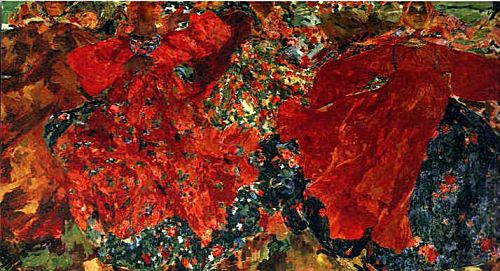
Philip Andreyevich Maliavin
1869 - 1940
_______________________
Autumn Comes
Li Ho (790-816)
Translated by Arthur Sze
Wind in the plane tree startles the heart: a grown man's grief.
By dying lamplight, crickets are weeping cold threads.
Who will ever read the green bamboo slips of this book?
Or stop the ornate worms from gnawing powdery holes?
Such thoughts tonight must disentangle in my gut.
In the humming rain, a fragrant spirit consoles this poet.
On an autumn grave, a ghost chants Pao Chao's poem,
and his spiteful blood, buried a thousand years, is now green jade. Poems from Arthur Sze's The Silk Dragon
Translations from the Chinese
The Drunken Boat Summer 2001
Interview with Arthur Sze
Drunken Boat
_______________________
 Sandy, Utah
close to nature
Steve B. Smith
via Mrs. Deane
_______________________
If it were only a question of "my" work, of the particular or isolated research of one individual, this wouldn't happen. Indeed, the violence of these denunciations derives from the fact that the work accused is part of a whole ongoing process. What is unfolding here, like the resistance it necessarily arouses, can't be limited to a personal "oeuvre," nor to a discipline, nor even to the academic institution. Nor in particular to a generation: it's often the active involvement of students and younger teachers which makes certain of our colleagues nervous to the point that they lose their sense of moderation and of the academic rules they invoke when they attack me and my work. If this work seems so threatening to them, this is because it isn't simply eccentric or strange, incomprehensible or exotic (which would allow them to dispose of it easily), but as I myself hope, and as they believe more than they admit, competent, rigorously argued, and carrying conviction in its re-examination of the fundamental norms and premises of a number of dominant discourses, the principles underlying many of their evaluations, the structures of academic institutions, and the research that goes on within them. What this kind of questioning does is modify the rules of the dominant discourse, it tries to politicize and democratize the university scene. If these blindly passionate and personal attacks are often concentrated on me alone (while sometimes maintaining that it isn't me but those who "follow" or "imitate" me who are being accused--an all too familiar pattern of argument), that's no doubt because "deconstructions" query or put into question a good many divisions and distinctions, for example the distinction between the pretended neutrality of philosophical discourse, on the one hand, and existential passions and drives on the other, between what is public and what is private, and so on. More and more I have tried to submit the singularity that is writing, signature, self-presentation, "autobiographical" engagement (which can also be ethical or political) to the most rigorous--and necessary--philosophical questioning. Not that I intend putting the subject (in the biographical sense) at the center or origin of philosophical discourse (indeed, I would normally be accused of doing the opposite), but I do try in each case to put these questions in their primary terms, to relate them with themes which no doubt must irritate or disturb certain colleagues who would prefer to repress them (for example questions of sexual difference and femininity, the "proper name," literature and psychoanalysis--but it would be necessary here to review so many other themes, scientific, technical, or political). All of this probably explains why my most resolute opponents believe that I am too visible, that I am a little too "personally" "alive," that my name echoes too much in the texts which they nevertheless claim to be inaccessible. In short, to answer your question about the "exceptional violence," the compulsive "ferocity," and the "exaggeration" of the "attacks," I would say that these critics organize and practice in my case a sort of obsessive personality cult which philosophers should know how to question and above all to moderate.
-
Derrida
from Points...: Interviews, 1974-1994
google books
_______________________
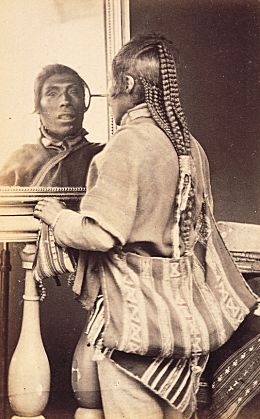
Ricardo Villalba
(attributed)
ca. 1875
An Even Greater Measure
George Eastman House
84 Selected Images
_______________________
466
Man shouldn't be able to see his own face - there's nothing more sinister. Nature gave him the gift of not being able to see it, and of not being able to stare into his own eyes.
Only in the water of rivers and ponds could he look at his face. And the very posture he had to assume was symbolic. He had to bend over, stoop down, to commit the ignominy of beholding himself.
The inventor of the mirror poisoned the human heart.
-
Pessoa, The Book of Disquiet
The book of disquiet
Fernando Pessoa
translated by Richard Zenith
google books
_______________________
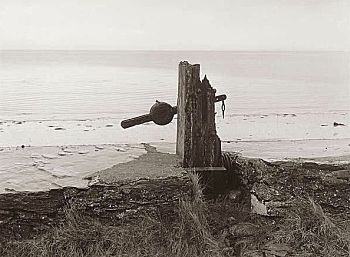
Rail Remains, Nr Criccieth
Ian Grant
_______________________
an excerpt from:
Education of the Stoic
Fernando Pessoa
There’s no greater tragedy than an equal intensity, in the same soul or the same man, of the intellectual sentiment and the moral sentiment. For a man to be utterly and absolutely moral, he has to be a bit stupid. For a man to be absolutely intellectual, he has to be a bit immoral. I don’t know what game or irony of creation makes it impossible for man to be both things at once. And yet, to my misfortune, this duality occurs in me. Endowed with both virtues, I’ve never been able to make myself into anything. It wasn’t a surfeit of one quality, but of two, that made me unfit to live life.
Whenever and wherever I had an actual or potential rival, I promptly gave up, without a moment’s hesitation. It’s one of the few things in life about which I never hesitated. My pride could never stand the idea of me competing with someone else, particularly since it would mean the horrid possibility of defeat. I refused, for the same reason, to take part in competitive games. If I lost, I always fumed with resentment. Because I thought I was better than everyone else? No: I never thought I was better in chess or in whist. It was because of sheer pride, a ruthless and raging pride that my mind’s most desperate efforts could do nothing to curb or stanch. I kept my distance from life and the world, and an encounter with any of their elements always offended me like an insult from below, like the sudden defiance of a universal lackey.
In times of painful doubt, when I knew from the start that I’d go wrong, what made me furious at myself was the disproportionate weight of the social factor in my decisions. I was never able to overcome the influence of heredity and my upbringing. I could pooh-pooh the sterile concepts of nobility and social rank, but I never succeeded in forgetting them. They’re like an inborn cowardice, which I loathe and struggle against but which binds my mind and my will with inscrutable ties....(more)
The Education of the Stoic: The Only Manuscript of the Baron of Teive
Fernando Pessoa
Edited and translated by Richard Zenith
Exact Change
classics of experimental literature
_______________________
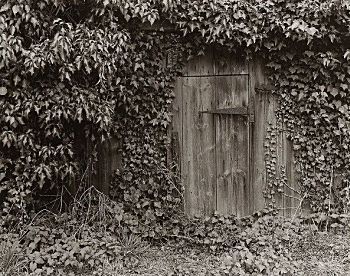
The Hyde
Lost Labours
Images of Our Post Industrial Landscape
Ian Grant
_______________________
Beckett Bethicketted
Stephen Dilks
Early in his career, Beckett consciously entangled himself in Joyce's method. Joyce, perhaps the most powerful figure in the avant-garde of writers in English when Beckett met him in 1929, encouraged the devotion of his fellow Dubliner. The parts of Finnegans Wake that allude to Beckett seem to lure him into Joyce's fold. In the following passage Joyce seems to adumbrate Beckett's early reaction to his text at the same time that he offers advice about how to read its complexities :
...the farther back we manage to wiggle the more we need the loan of a lens to see as much as the hen saw. Tip. You is feeling like you was lost in the bush, boy? You says: It is a puling sample jungle of woods. You most shouts out: Bethicket me for a stump of a beech if I have the poultriest notions what the farest he all means. Gee up, girly! The quad gospellers may own the targum but any of the Zingari shoolerim may pick a peck of kindlings yet from the sack of auld hensyne.
An extended analysis of this passage demonstrates what Beckett was trying to get over when he vowed to "get over J.J." in his note to George Putnam in 1932....(more)
_______________________
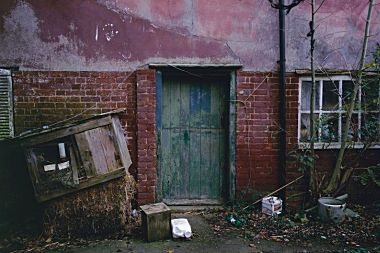
Justin Partyka
_______________________
Herta Mueller Nobel Prize Roundup
Scott Esposito

Portale
Simon Menner
_______________________
From a Notebook that Never Was
The ridiculous, work, and dedication
Fernando Pessoa
Translated by Richard Zenith
In me every thought, however much I’d like to preserve it intact, turns sooner or later into reverie. If I wish to set forth reasons or launch a train of argument, what comes out of me are sentences initially expressive of the thought itself, then phrases subsidiary to those initial sentences, and finally shadows and derivatives of those subsidiary phrases. I begin to meditate on the existence of God and soon find myself speaking of faraway parks, feudal processions, rivers that pass almost soundlessly beneath the windows of my contemplation . . . And I find myself speaking about them because I find myself seeing them, feeling them, and there’s a brief moment when my face is grazed by a real breeze rising from the surface of the dreamed river through metaphors, through the stylistic feudalism of my central self-abandon.
I like to think, because I know it won’t be long before I stop thinking. It’s as a point of departure that thinking delights me—a cold, metallic harbor station from which to set sail for the vast South. I sometimes try to focus my mind on a large metaphysical or even social problem, because I know that, ensconced in the hoarse voice of my reason, there are peacock tails ready to spread open for me as soon as I forget I’m thinking, and I know that humanity is a door in a wall that doesn’t exist, so I can open it onto whatever gardens I like....(more)
_______________________
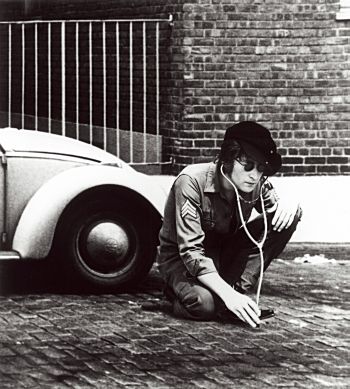
John Lennon
October 9, 1940 – December 8, 1980
God is a concept
by which we measure our pain.
(...)
I was the dreamweaver
but now i'm reborn.
I was the walrus
but now i'm john.
And so, dear friends,
you just have to carry on,
the dream is over.
_______________________
Fred Clark on the
the Conservative Bible Project
Among the many humorous aspects of this undertaking is the CBP organizers' confidence that this project will be easy. They hope to harness the power of wiki to quickly produce a new translation. An army of homeschoolers, they are convinced, should be able to accomplish this in a matter of months.
Some of those footsoldiers may well work as quickly as they imagine. The gruntwork of the Berlitz barbarism they have in mind as "translation" doesn't require much thought or care. And this project is easier than most translation, because the translators already know ahead of time what it is they're going to make the text say.
But I also think that army of homeschoolers is going to have more than a few deserters. I suspect this project will, for many, become a matter of a little learning being a dangerous thing. Alps on alps arise, and apocalypse upon apocalypse. The text will speak for itself. It's not going to lose this fight. The Conservative Bible Project, I suspect, will come to work as a subversive virus, creating far more converts from than to its cause....(more)
in an earlier post
Don't think of it as a point further out along an ideological spectrum, think of it as a point further along in the inevitable chronology of American evangelicalism.
_______________________
History and Hopelessness
Mass Mobilization and Contemporary Forms of Anticapitalism
Moishe Postone
Public Culture 18:1
available here
To the degree we choose to use “indeterminacy” as a critical social category, then, it should be as a goal of social and political action rather than as an ontological characteristic of social life. (The latter is how it tends to be presented in poststructuralist thought, which can be regarded as a reified response to a reified understanding of historical necessity.) Positions that ontologize historical indeterminacy emphasize that freedom and contingency are related. However, they overlook the constraints on contingency exerted by capital as a structuring form of social life and are, for this reason, ultimately inadequate as critical theories of the present. Within the framework I am presenting, the notion of historical indeterminacy can be reappropriated as that which becomes possible when the constraints exerted by capital are overcome. Social democracy would then refer to attempts to ameliorate inequality within the framework of the necessity imposed structurally by capital. Although indeterminate, a postcapitalist social form of life could arise only as a historically determinate possibility generated by the internal tensions of capital, not as a “tiger’s leap” out of history. _______________________
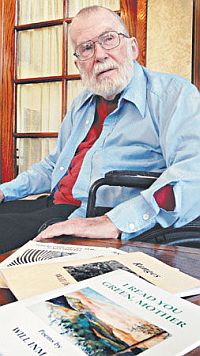
Will Inman
1923 – 2009
photo - Xavier Gallegos/Tucson Citizen
'Community poet' Inman dies at 86
Kimberly Matas
arizona daily star
"We live in a time of broken sprits," he said in a 1992 Star article. "We live in a Lazarus age. We're all partly dead, and we need to learn how to raise each other from the dead — without pretending to be Jesus in the process.
"Everybody is broken, but everybody has the capacity to help each other."
.....................................................
from Surfings:
Selected Poems of Will Inman
Edited by David Ray and Michael Rattee
from 108 Verges Unto Now
Was it Beethoven who
limbered my river back to its coils?
Was it Whitman who remembered me
that oceans can?t be straightened?
First I dreamt I stood surfedge
stared cold on iridescent still
blue green water, tepid waves
curled slow and low and hardly
in under hot lowhung Sun
centered down two long rows of
dead tree-trunks, branch-nubs
lifted up like scorched hands;
I awakened full of dread.
ocean and ocean and ocean and sea
and the sun fell like rotten rind
in me
fermenting?
(wonder why I was let live?)
...(more) Light and Dust Anthology of Poetry
_______________________
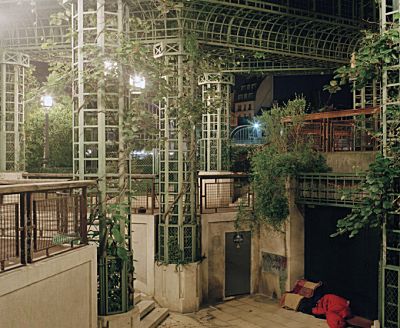
Place M Quentin
Paris
Simon Menner
via Mrs. Deane
_______________________
A Matter of Enthusiasm
Raymond Federman
written a few months ago and posted by Robert Archambeau
I am rereading Malone Dies
just to mock death a little
and boost my cancerous spirit.
I shall soon be quite dead at last
Malone tells us at the beginning
of his story.
What a superb opening
what a fabulous sentence.
With such a sentence
Malone announces his death
and at the same time delays it.
In fact all of Malone’s story
is but an adjournment.
Malone even manages
to defer his death
until the end of eternity.
That
soon is such a vague word.
...(more)
_______________________
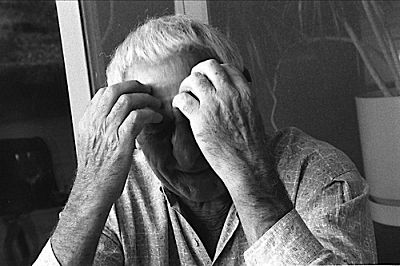
Raymond Federman
Photo: Bruce Jackson
via Lumpy pudding
Reflections on Ways to Improve Death
Raymond Federman
posted at EXPLORINGfictions
.....................................................
For Raymond Federman
Camelia Elias
FRAG/MENTS
Surface Disturbances [pdf]
A reading of Raymond Federman’s surfictions as historiographic radical metafictions
Lisbeth Rieshøj Pedersen
_______________________
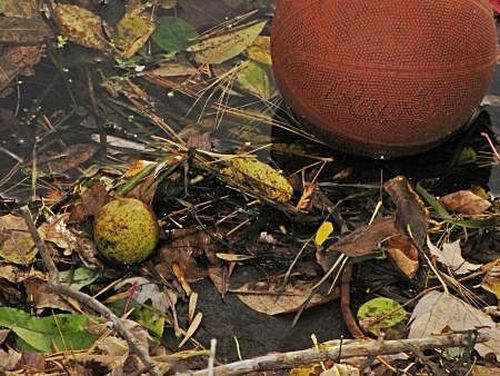
photo - mw
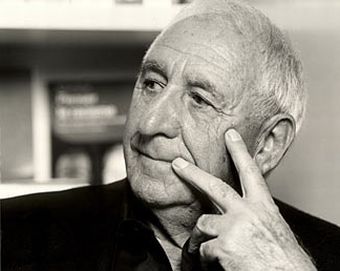
Raymond Federman
(1928-2009)
Moinous
IN THE SANDBOX He constantly tortures himself to know who he is, he wants to know, wants to understand himself, but perhaps it is this ignorance of his self that is his strength, his destiny, never to understand himself and to remain always misunderstood ... He offers himself totally, his head, hands, mind, soul, zipper, all open, not to expose himself, but as an initiatory gesture ... This is his way of saying, I am here, everything I have is here take it ... Such ego as he may be said to have is the referred ego of those outside of him who give it back to him as they see him ... He is not generous in any received social, sentimental sense, it is simply his nature not an acquired virtue, a personal gesture, like the way he watches over others ... He is a child in a sandbox asking others to come and play, but no one comes to play with him ... More often than not, they mirror him, but the mirroring does not reflect, it obscures who he is ...
- self-blurb from The Laugh That Laughs at the Laugh
.....................................................
Here & Elsewhere
Raymond Federman on Faith & Reason
I cannot write I cannot write
when I want to, when I need to.
I mean I cannot write
what must be written
what demands to be written.
Every morning I ask myself : why?
No good, nothing, nothing, nothing.
How long will this go on?
Everyday I wake up and around me
terror earthquake murder fire killing
the newspaper the radio the television
tanks famine death war corruption bombs.
Where am I, me, I mean?
And you? Where are you?
Torn away. Displaced. Angry.
It's not that I cannot write
oh yes I can write
anything I want
but it's this one thing
this one thing I cannot write
this thing that refuses
to let itself be written
to surface out of me.
The horror in the world
the human debacle.
Reading writing speaking
my life has been but that
a life of words
a pell mell babel of words
a life full of stories
but a life anyway.
I awake here in exile
It's because of the world
because of history
because of what goes
on in the world
that concerns us
frightens us
dejects us
saddens us
the moment I jump
out of bed there is
this horror in the world
and I cannot write it.
I cannot say which
is my country today
it constantly changes
it's always the country
that invades me
devastates me
that makes me angry
I remain caught
in this incapacity
to detach myself
from this .... this ...
arrachement.
My body seemingly here
but my mind elsewhere
full of sordid images
It's exhausting to be
where one is not
and not be where one is
While brushing my teeth
I hear the cracked voice in me
whisper: this is the day
the day of rapprochement
the day of frenetic work
and then....
Where was I last
where was I seen last
where will I be today?
Jerusalem?
Paris?
Berlin?
Kabul?
.....................................................
Raymond Federman Feature and interview
ReadySteadyBook
Double or nothing: a real fictitious discourse
Raymond Federman
google books
Critifiction: postmodern essays
Raymond Federman
google books
The Imagery Museum Of Samuel Beckett
Raymond Federman
Lecture delivered in February 2000, at the Kunsthalle in Vienna on the occasion of a Beckett and Bruce Nauman exhibition
Samuel Beckett: The Gift Of Words
Raymond Federman
The Laugh That Laughs at the Laugh:
Writing from and about the Pen Man, Raymond Federman
edited by Eckhard A. Gerdes
google books .....................................................
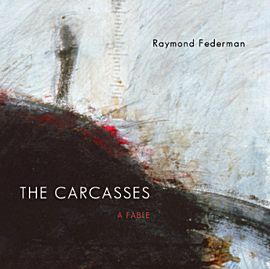
THE CARCASSES: A Fable
Raymond Federman
BlazeVOX Books (August 2, 2009)
amazon link excerpt from Carcasses
Posted by Jerome Rothenberg
.....................................................
"for me now it's floating language..."
Raymond Federman reading from Take it or Leave it.
ra - 20 min
Fantasies of the Autobiographical Self: [pdf]
Thomas Bernhard, Raymond Federman, Samuel Beckett
Alfred Hornung _______________________

photo - mw
_______________________
"Rule A: Don't. Rule A1: Rule A doesn't exist. Rule A2: Do not discuss the existence or non-existence of Rules A, A1, or A2."
R. D. Laing
b, Oct 7, 1927Special Issue: The Legacy of R. D. Laing
Janus Head
Spring 2001
_______________________
Idling From Pol Pot's Smile
Peter Fröberg
Translated from the Swedish by Silvester Mazzarella
(....)
It takes barely five minutes to walk the four hundred and seventy-five meters from the gateway of Angkor Wat to its innermost temple. It was built in the twelfth century, and its towers symbolize the five holy mountains of India. The sea is represented by a magnificent moat. Spread over the surrounding ten or so square kilometers are ponds and reservoirs as big as lakes, excavated by hand. Among them stand hundreds of massive temples. It has no counterpart in all the world. It is believed that when Angkor Wat was built, more than a million people lived there, making it one of the largest cities of its time. Larger than Peking, larger than Paris. The silhouette of Angkor Wat has appeared on all Cambodia's national flags. It has been shown with the light behind it and as seen in the morning and at evening in books of photographs and on picture postcards. Tourists come from all over the world to see it. And the buildings are undeniably of breathtaking beauty.
Less frequently do people discuss how the temples were built. How so many magnificent buildings could have been constructed with such primitive means in such a short time. Historians believe only a slave society could have done it. One single great labor camp.
It is easy to bandy about statistics of height and weight and time. But how many lives did it cost to build this glorious miracle? How long does it take to forget the terror and the oppression and just see the monuments? ...(more)
Words Without Borders October 2009:
Foreign Correspondents: International Reporting
_______________________
The lives of others
Nina Power reviews
Frames of War: When is Life Grievable? by Judith Butler and Killing in War by Jeff McMahan
tpm

Couvent Sainte Marie de la Tourette
photo - Tim Benton
Art and Architecture
The Courtauld Institute of Art
_______________________
The Metaphysics of Youth
Walter Benjamin
Selected Writings Vol.1, 1913-1926. Ed. Marcus Bullock, Michael W. Jennings
medifire download
Conversation strives toward silence, and the listener is really the silent partner. The speaker receives meaning from him; the silent one is the unappropriated source of meaning. The conversation raises words to his lips as do vessels, jugs. The speaker immerses the memory of his strength in words and seeks forms in which the listener can reveal himself. For the speaker speaks in order to let himself be converted. He understands the listener despite the flow of his own speech; he realizes that he is addressing someone whose features are inexhaustibly earnest and good, whereas he, the speaker, blasphemes against language.
But even if he revives an empty past through orgiastic excitement, the listener hears not words but the silence of the present. For despite the flight of spirit and the emptiness of words, the speaker is present; his face is open to the listener, and the efforts made by his lips are visible. The listener holds true language in readiness; the words enter him, and at the same time he sees the speaker.
Whoever speaks enters the listener. Silence, then, is born from the conversation. Every great man has only one conversation, at whose margins a silent greatness waits. In the silence, energy was renewed; the listener led the conversation to the edge of language, and the speaker creates the silence of a new language, he, its first auditor.
Silence is the internal frontier of conversation..............
_______________________
The 's lot' turns 9
Many thanks to you all for your continued interest and patience.
_______________________
The Map
Elizabeth Bishop
Land lies in water; it is shadowed green.
Shadows, or are they shallows, at its edges
showing the line of long sea-weeded ledges
where weeds hang to the simple blue from green.
Or does the land lean down to lift the sea from under,
drawing it unperturbed around itself?
Along the fine tan sandy shelf
is the land tugging at the sea from under?
The shadow of Newfoundland lies flat and still.
Labrador's yellow, where the moony Eskimo
has oiled it. We can stroke these lovely bays,
under a glass as if they were expected to blossom,
or as if to provide a clean cage for invisible fish.
The names of seashore towns run out to sea,
the names of cities cross the neighboring mountains
--the printer here experiencing the same excitement
as when emotion too far exceeds its cause.
These peninsulas take the water between thumb and finger
like women feeling for the smoothness of yard-goods.
Mapped waters are more quiet than the land is,
lending the land their waves' own conformation:
and Norway's hare runs south in agitation,
profiles investigate the sea, where land is.
Are they assigned, or can the countries pick their colors?
--What suits the character or the native waters best.
Topography displays no favorites; North's as near as West.
More delicate than the historians' are the map-makers' colors.
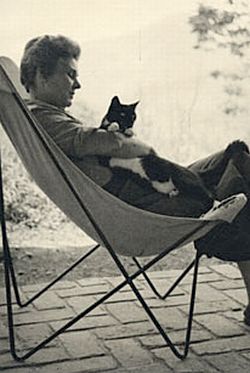
Elizabeth Bishop
d. 6 October 1979
photo: J.L. Castel, 1954 Elizabeth Bishop - Poems (Anthology)
scribd
A Formal, Melancholy Soul
Casey N. Cep on Elizabeth Bishop
From such a painfully unstable life came some of the most stable poems of the twentieth century.(....)
She resisted the confessional poetry of her contemporaries and for it we have rewarded her with a canonical immortality arguably greater than that of Lowell or Plath. She would probably object to the recent popularization of her work through feminist and queer studies, as she abhorred divisive approaches to poetry, but her status has come largely from the complex variability of each of her poems. By not placing the poet at the center of her poetry, she opens a space for readers representing a diversity of backgrounds and critical interests....(more)
Rough Gems
David Orr reviews 'Edgar Allan Poe & the Juke-Box,' by Elizabeth Bishop
That she worked in one of our country's least popular fields, poetry, doesn't matter. That she was a woman doesn't matter. That she was gay doesn't matter. That she was an alcoholic, an expatriate and essentially an orphan — none of this matters. What matters is that she left behind a body of work that teaches us, as Italo Calvino once said of literature generally, "a method subtle and flexible enough to be the same thing as an absence of any method whatever."...(more)
"Controlled Panic":
Mastering the Terrors of Dissolution and Isolation in Elizabeth Bishop's Epiphanies
Martin Bidney Style, Fall, 2000
_______________________
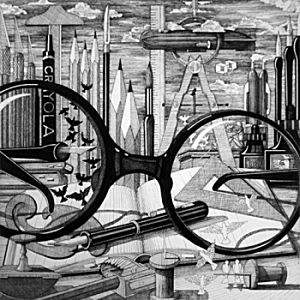
Le Corbusier's View
John Dennison: Tableaux Printemps
John Dennison at Diane Farris Gallery
Vancouver, Canada
_______________________
How Does One Become Guy Debord? [PDF]
Michael Calderbank
... the erection of a whole academic sub-industry around the SI threatens to see them immortalised and turned into something of a fetish: the obsession with the last of the real revolutionaries, the authentic expression of radical Sixties’ counterculture at its purest. The tenor of such a retrospective fascination with the situationists might be taken as a painful measure of the isolation of cultural studies from the political as such. Sentimental nostalgia for an age in which revolutionary social and cultural aspirations still seemed possible functions, in this context, to compensate for an admission of impotence in the present. Often implicit in this approach is the assumption that the situationists must have known, deep down, that their demands were too utopian to stand any chance of being realised. In this light, their project looks like a glorious last stand, prior to the inevitable triumph of consumer capitalism and onset of postmodern cynicism.
Yet, what if we refuse to view their failure through the lens of such nostalgic inevitability, and stubbornly persist in the notion that the situationists genuinely believed it possible to realise their ‘impossible’ demands in full? What if we refuse to accept the current trend to develop cults of personality around the heroic failures of Debord and his comrades, and, instead, see the exaggerated presence of the SI in the contemporary cultural imagination as symptomatically masking a more fundamental repression still working to deny us consciousness of the real historical possibilities of revolutionary change? In this case, rather than seeking to isolate and fetishise the uniquely individual characteristics which defined the situationist ‘moment’, we would need to critically assess the obstacles preventing the radical self-dissolution they desired. This would involve a greater critical scrutiny of the specific context which gave rise to the articulation of such a project, and necessitate a more engaged evaluation of the specific tactical and strategic positions they adopted.
The Situationist International Text Library
A User’s Guide to Détournement
Guy Debord, Gil J Wolman
Translated by Ken Knabb
Situationist International Anthology
Edited and translated from the French by Ken Knabb
_______________________
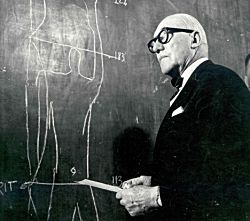
Le Corbusier b.Oct 6, 1887
_______________________
A Wave of Dreams [PDF]
Louis Aragon (1924)
Translated by Susan de Muth
Sometimes I quite suddenly lose the whole thread of my life: sitting in some corner of the universe, near a smoky dark café, polished bits of metal set out before me, tall, mild-mannered women ebbing and flowing around me, I wonder how I finally washed up here beneath this arch that is really the bridge they have named sky. This is the moment of oblivion, the moment when vast fissures in the Palace of the World widen into daylight: I would give up the rest of my life - a paltry sum - if only it could endure. For then the mind detaches a little from the human machine and I am no longer the bicycle of my senses, a grindstone honing memories and encounters. And then I grasp chance within me, I grasp all of a sudden how I surpass myself: I am chance, and having formed this proposition I laugh at the thought of all human activity. This would certainly be a glorious moment to die, this certainly is the moment when the ones who simply leave one day with a clear gaze do kill themselves. It is at this point, in any case, that thought begins; thought nothing like that looking-glass game many are so good at yet which holds no dangers. Anybody who has experienced this vertigo even once can no longer endorse the mechanistic ideas at the heart of nearly all man’s present endeavours, and his entire peace of mind. Now the ill-considered axiom at the bottom of what seemed to be the purest thought-process is clear to see: clinging to some other, forgotten system no longer under scrutiny, it evaded critical evaluation yet left the unchallenged concept like a rut in the mind. This is why philosophers talk in proverbs and feel they have to prove everything. They shackle their own imaginations with foreign rings, robbed in famous graves. By making out that Truth has many facets, they believe in only partial truths.
(...)
We have seen then what the Surreal is about. But to really understand the concept we have to extend it; view it perhaps like the horizon which continually flees before the walker, for like the horizon this concept exists between the mind and what it knows it will never reach. Having weighed up its experience of Reality - in which it indiscriminately mixes everything that exists - the mind naturally juxtaposes what it knows of the Unreal. Only when the mind has gone beyond these two notions can it begin to envisage a wider experience, one where these other two experiences co-exist, and that is the Surreal. Surreality, the state where these concepts are fused by the mind, is the shared horizon of religion, magic, poetry, dreaming, madness, intoxication and this fluttering honeysuckle, puny little life, that you believe capable of colonizing the heavens for us.
Centre for the Study of Surrealism and its Legacies
_______________________
Filozofski vestnik International
edited by Peter Klepec
the first print-to-OA conversion undertaken by Open Humanities Press via infinite thØught
_______________________
"Architecture as political practice" [pdf]
Roemer Van Toorn and Marcus Miessen
aaaarg - free reg. req.
RvT
You have had an ongoing conversation with Chantal Mouffe over the last year, investigating the potential of a move into a definition of architecture practice as a form of radical democracy, and how dissensus works in operation on the level of architecture (city and building). What is her definition of the political and how do you translate that into your practice?
MM
Chantal has written extensively on the struggle of politics and the radical heart of democratic life, trying to understand why in the kind of society we are living today, which she calls a post-political society, there is an increasing disaffection with democratic institutions. Her main thesis, if I may say so, is that the dimension of the political is something that is linked to the dimension of conflict that exists in human societies: an ever-present possibility of antagonism. The reason why I have been very interested in this exchange was to understand how this agonistic struggle could be imagined and tested in spatial settings, frameworks, which would allow to envisage a struggle between different interpretations of shared principles, a conflictual consensus, as Chantal says, a “consensus on the principles, disagreement about their interpretation”. Democratic processes should aim to supply an arena in which differences can be confronted. Agonism as a constructive form of political conflict might offer an opportunity for constructive expression of disagreements. From my point of view, this becomes most interesting on an institutional scale, a microcosm that essentially could reflect society at large. The post-political society that Chantal refers to is one, in which we are constantly being told that the partisan model of politics has been overcome, that there is no more Left and Right: there is this kind of consensus at the centre, in which there is really no possibility for an alternative. This is precisely why there is a serious need for the creation of agonistic publics and public spaces. When I say public space, I don’t refer to landscape architecture, but to the ‘becoming spatial’ of political forms of exchange. One could argue that any form of participation is already a form of conflict. In order to participate in an environment or a given situation, one needs to understand the forces of conflict that act upon that environment. How can one move away from romanticised notions of participation into more pro-active, conflictual models of engagement? And architecture is always political, as it is the result of a complex structure of decision-making processes, both public and private in nature. Therefore, architecture is also always produces new social realities as space structures relationships between people, be it in a positive or negative way. _______________________
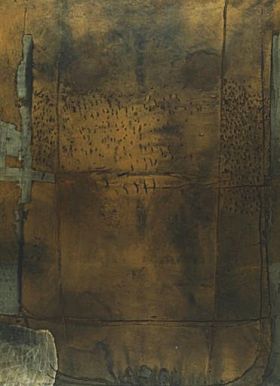 Grey Ochre
Antoni Tàpies
1958 224 images
_______________________
End of Summer
Stanley Kunitz
1905 - 2006
An agitation of the air,
A perturbation of the light
Admonished me the unloved year
Would turn on its hinge that night.
I stood in the disenchanted field
Amid the stubble and the stones,
Amazed, while a small worm lisped to me
The song of my marrow-bones.
Blue poured into summer blue,
A hawk broke from his cloudless tower,
the roof of the silo blazed, and I knew
that part of my life was over.
Already the iron door of the north
Clangs open: birds, leaves, snows
Order their population forth,
And a cruel wind blows.
-
_______________________

Vietnam War Memorial
Washington DC (1999)
Hiroshi Watanabe
Catherine Edelman Gallery Hiroshi Watanabe
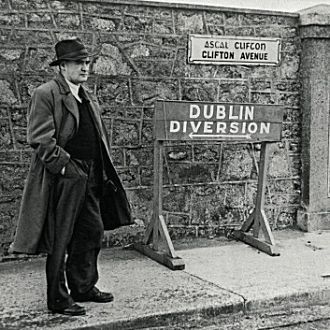
Brian O'Nolan - Flann O'Brien
(5 October 1911 – 1 April 1966)
Dalkey Archive Press publishes Brian O'Nolan
Reading Flann Brian O’Brien O’Nolan
Gilbert Sorrentino
CONTEXT
Flann O’Brien is one of the half-dozen or so greatest comic writers in the English language of this or any other century, the equal of such geniuses of comedy as Sterne, Joyce, Beckett, Waugh, and Firbank. His mastery of comedic prose, its nuances, tropes, and subversions, is of such high degree that the merest gesture of his stylistic hand can turn a sentence or phrase from its course as sober conveyor of information to sabotager and ridiculer of that same information. Done the right way (and O’Brien invariably does it the right way), such writing can virtually collapse referential material and transform it into brilliant constellations of devastating hilarity. Little can stand before comedy of such purity, comedy so intensely focused and authorative that it rises above ideology, factionalism, religion, and the bloated niceties of propaganda and "right thinking." Inventors, or if you please, marshals of such anarchic laughter are dangerous people indeed, informed, as they are, by love, hatred, and, above all, perhaps, a salutary shame for the human species and its ridiculous pettinesses and pretensions.
The Last LaughJoseph O'Neill atlantic
The author pseudonymously known as Flann O’Brien (1911–1966) is the shadowy and indeed overshadowed hero of modern Irish fiction, the bronze medalist on a podium otherwise occupied by Joyce (gold) and Beckett (silver). Flann O’Brien’s relative inferiority is as much a matter of style as of substance. The top two were glamorously exilic, highly photogenic, eminently stern of artistic purpose. By contrast, Brian O’Nolan (the fellow behind the pseudonym) stayed put in Dublin, and very seedily so. In pictures he looks like yer man without qualities: a hat, a coat, a blur of dark little features. And except perhaps in the matter of drinking, sternness of purpose was precisely the quality he lacked: if his ambition was to forge in the smithy of his soul the uncreated conscience of his race, he never mentioned it. “I can’t go on, I’ll go on,” the protagonist in Beckett’s The Unnamable famously asserts. When Brian O’Nolan couldn’t go on, he didn’t.
That, at least, is how the story goes. As Anthony Cronin, O’Nolan’s relentlessly perceptive biographer, points out, O’Nolan was merely in his mid-30s when he became saddled (by himself, among others) with “the legend of early, unfulfilled brilliance [and] the all too easily sustained judgement of alcoholic decline.” Over time, this legend grew into a Dublin version of the parable of the prodigal son, only with a sadder ending....(more)
_______________________
The Gaelic
Excerpt from 'Irish and Related Matters'- 'The Best of Myles'
Cur, g. curtha and cuirthe, m. - act of putting, sending, sowing, raining discussing, burying, vomiting, hammering into the ground, throwing through the air, rejecting, shooting, the setting or clamp in a rick of turf, selling,addressing, the crown of cast iron buttons which have been made bright by contact with cliff faces, the stench of congealing badgers suet, the luminence of glue-lice, a noise made in a house by an unauthorised person, a heron's boil, a leprachauns denture, a sheep biscuit, the act of inflating hare's offal with a bicycle pump, a leak in a spirit level, the whine of a sewage farm windmill, a corncrakes clapper, the scum on the eye of a senile ram, a dustmans dumpling, a beetles faggot, the act of loading ever rift with ore, a dumb man's curse, a blasket, a 'kur', a fiddlers occupational disease, a fairy godmothers father, a hawks vertigo, the art of predicting past events, a wooden coat, a custard-mincer, a blue-bottles 'farm', a gravy flask, a timber-mine, a toy craw, a porridge mill, a fair day donnybrook with nothing barred, a stoats stomach-pump, a broken-
.....................................................
A pub without a side-door up a lane would have been as well off with no door at all
-
Flann O'Brien
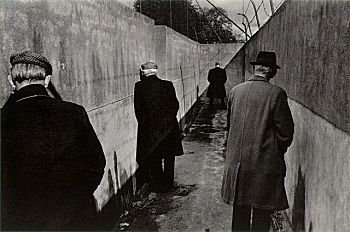 Ireland
Josef Koudelka
1976
the no-bicycle page
An atomy of the novel:
Finn O'Brien's 'At Swim-Two-Birds.'
David Cohen
Twentieth Century Literature, Summer, 1993
Flann O'Brien: a portrait of the artist as a young post-modernist
Keith Hopper
google books
Three Beginnings
Excerpt from Flann O'Brien's
At Swim-Two-Birds
openings - the first:
The Pooka MacPhellimey, a member of the devil class, sat in his hut in the middle of a firwood meditating on the nature of numerals and segregating in his mind the odd ones from the even. He was seated at his diptych or ancient two-leaved writing-table with inner sides waxed. His rough long-nailed fingers toyed with a snuff-box of perfect rotundity and through a gap in his teeth he whistled a civil cavatina. He was a courtly man and received honour by reason of the generous treatment he gave his wife, one of the Corrigans of Carlow....(more)
_______________________
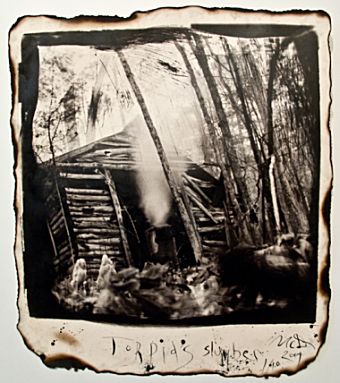
Torpid's Slumber
Michael Donnor
_______________________
A Second Life: Notes on Adorno's Reading of Proust
Alexander García Düttmann
The name of a place can promise happiness, Adorno says in this section ("Meditations on Metaphysics", Negative Dialectics) after appealing to Proust. For the promise to be kept, for happiness to come into existence, all that would seem to be required is a visit to the actual place. And yet when, attracted by the force inherent in the promise of happiness, one arrives at the place in question, one finds that happiness withdraws as if it were a rainbow. What has allowed then for an experience here is precisely the difference between the name and the named. Adorno does not wish to denounce the anticipation of the imagination as an illusion, just as he does not wish to reduce the experience to the discovery of an empirical truth. This is why he insists on the fact that the withdrawal of happiness at the point where one would expect to be happy does not amount to a disappointment. Rather, one realizes that, having arrived at the place itself by following the trail laid out by the name, one has been brought too close to the promised happiness for it to be experienced as such. Happiness, then, lies neither in the image emanating from the name nor in the reality of the place named, but in the space and in the time stretched out between the image and reality. It springs from seeing something from the inside. However, insofar as the inside is just the other side of the outside, it only appears truly when removed from the thing. What Adorno gives here is the exact definition of the idea, even if he does not employ the philosophical term. In his “Short Commentaries,” he characterizes Proust as a “Platonist” who dismissed opinion. Could one summarize Adorno’s argument by asserting that happiness is linked to the disclosure of the idea? That happiness is to be found residing in neither the name nor the named may only be understood once one has undergone the experience of searching for it in the place or the reality towards which the name points. Happiness, in other words, would depend entirely on whether one reaches a limit at which a second life could begin; one that is not the imaginary life of the promise and yet does not merge with real life in the conventional sense. It is as if the fulfillment of the promise of happiness consisted in the preservation of its form instead of the actualization of its content, or as if keeping the promise meant returning to it so as to render the form a part of the content. Adorno speaks here of a “metaphysical experience,” and not of experience in general, because he wants to highlight the distance that separates happiness from both a matter of fact and a state of mind. Metaphysics interpreted in this manner has something to do with one’s own comportment towards life, with a pursuit of happiness and the yielding of an insight that manifests itself in the form of a lack of disappointment. It thereby acquires a moral or ethical dimension. By protecting each other from dumbness and madness—from the necessity of the literal and the vacuity of the figurative, from the ontological “there is” and the psychological “as if”—the name and the named bestow happiness with the reality of a second life. What Adorno ultimately suggests is that the named is too real to be real in any morally relevant fashion while the name, on the contrary, is never real enough. Does Proust not write, in the last volume of the Recherche, that it is always the attachment to an object owned that provokes the death of the owner? In the wake of Adorno’s reading of Proust, one could claim that happiness is not an object to be owned, that it does not have the form of a real thing, and that in becoming attached to it one runs the danger of turning it into something that could be appropriated. ...(more)
World Picture
(Summer 2009) happiness
via Philosophy's Other
_______________________
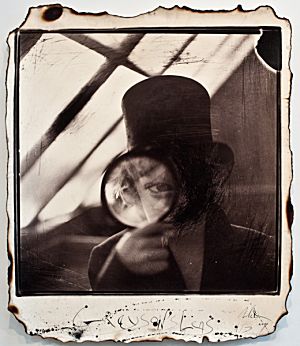
Grayson's Lens
Michael Donnor
_______________________
“Minnesota Declaration” / Truth and fact in documentary cinema
Werner Herzog
Walker Art Center, Minneapolis, Minnesota, April 30, 1999
Lessons Of Darkness
1. By dint of declaration the so-called Cinema Verité is devoid of verité. It reaches a merely superficial truth, the truth of accountants.
2. One well-known representative of Cinema Verité declared publicly that truth can be easily found by taking a camera and trying to be honest. He resembles the night watchman at the Supreme Court who resents the amount of written law and legal procedures. “For me,” he says, “there should be only one single law; the bad guys should go to jail.”
Unfortunately, he is part right, for most of the many, much of the time.
3. Cinema Verité confounds fact and truth, and thus plows only stones. And yet, facts sometimes have a strange and bizarre power that makes their inherent truth seem unbelievable.
4. Fact creates norms, and truth illumination.
5. There are deeper strata of truth in cinema, and there is such a thing as poetic, ecstatic truth. It is mysterious and elusive, and can be reached only through fabrication and imagination and stylization.
6. Filmmakers of Cinema Verité resemble tourists who take pictures of ancient ruins of facts.
7. Tourism is sin, and travel on foot virtue.
8. Each year at springtime scores of people on snowmobiles crash through the melting ice on the lakes of Minnesota and drown. Pressure is mounting on the new governor to pass a protective law. He, the former wrestler and bodyguard, has the only sage answer to this: “You can’t legislate stupidity.”
9. The gauntlet is herby thrown down.
10. The moon is dull. Mother Nature doesn’t call, doesn’t speak to you, although a glacier eventually farts. And don’t you listen to the Song of Life.
11. We ought to be grateful that the Universe out there knows no smile.
12. Life in the oceans must be sheer hell. A vast, merciless hell of permanent and immediate danger. So much of hell that during evolution some species—including man—crawled, fled onto some small continents of solid land, where the Lessons of Darkness continue.
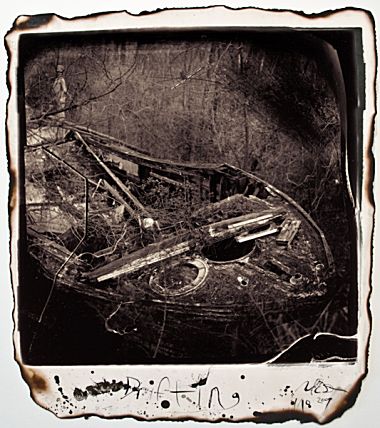
Drifting
Silent Moan
Photographs by Michael Donnor
Soulcatcher Studio
via gmtPlus9 (-15)
_______________________
The Sea Spoke in Tongues
Robert Gibbons
Turning, I suppose, is the word for reaching the age of sixty-three today, for while walking alone the Sea spoke in tongues, spoke in as many tongues as passengers on the Holland-America Line cruise ship, whom I also overheard as they disembarked & strolled around the city & parks & seashore, but I doubt they heard the Sea speak as it spoke to me in tongues about the Time before Birth. Long-ago gestations of cells algae amoebas eggs & myself & all of us & those to come. We may fret about Death, but not about the Time before Birth. The Time before birth the Sea said, did not hurt, nor will Death. The Sea receding in its tide spoke to me. The Sea beside me in my walk alone today turning sixty-three spoke, or sung a gentle lullaby about Time before Birth, & that it did not hurt, nor will Death.
Happy Birthday Robert.
_______________________
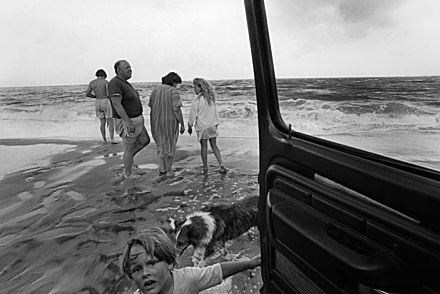
Eugene Richards
_______________________
The Spectre of Exile
Dylan Trigg
side effects
I am wading through old photos. Some of these digital photos have never been opened, and those which are “portrait” have yet to be rotated to “landscape,” and vice-versa. Nor have the small thumbnails digitally formed. The effect is like removing the dust from an old frame to find a radiant melancholy shinning through. A new melancholy, a melancholy of a life that existed by my side, and yet one I was oblivious to.(....)
... I found a passage from E.M. Cioran that crystallised my absurd malaise:
So many memories that loom up without apparent necessity—of what use are they, except to show us that with age we are becoming external to our own life, that these remote “events” no longer have anything to do with us, and that one day the same will be true of this life itself (Anathemas and Admirations, 200) (....)
Where are you? Sometimes, bodies can be animated by people who were not born into that material place, and in the process we lose sight of all that is familiar to this person. Yet the photos exist, like the aftermath of a forgotten civilisation. In several of these photos, places appear that I can see from my window. Yet at no point do the photo and the place outside my window align. What would happen if I tried to trace the outline of the rust on this photographed door with the door outside my window? Would that heal the dislocation I experience in this tension? Would I believe that these photos are in fact documents of a life that actually took place?...(more)
_______________________
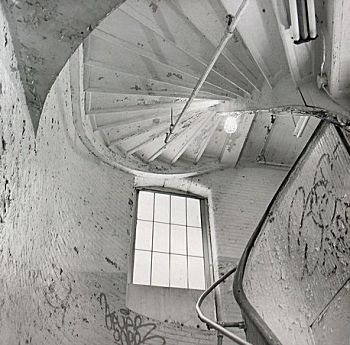
Pandora Mill stairs
New England Mills and Barns
Maria Levitsky
flickr
Maria Levitsky
_______________________
Walter Benjamin and the Architecture of Modernity [pdf]
Andrew Benjamin and Charles Rice (eds.)
re.press
via Pro-logus
.....................................................
re.press
"In a global environment marked by timidity and laxness in thought, re.press publishes outstanding work in contemporary philosophy. A dedicated philosophy press—one of the very few active in the Anglophone world today—re.press is committed to publishing rigorous philosophy that doesn’t give way on its desire. At once exclusive and egalitarian, re.press seeks to support and disseminate such thought worldwide.
In line with this ambition, re.press is itself a new kind of publisher. Attentive to the latest developments in contemporary technologies, re.press publications are available globally, wherever there is access to the internet. We seek to make as many of our publications as possible available as open-access files, free to anyone who wishes to download them. Our hard-copy books are print-on-demand, minimizing waste and cost. Yet our publications also maximize design values, boosting clarity and aesthetic qualities."
_______________________
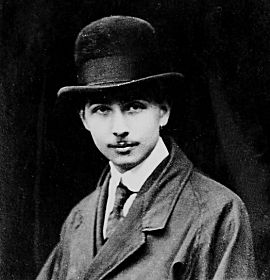
Louis Aragon
October 3, 1897 – December 24, 1982
The mythic and the real: Theater and city of Louis Aragon
Gray Read
synæsthesia
In the 1920s, when modern architects called for clarity and light, surrealist poet Louis Aragon described essential architecture as darkness, defined by its interiors and its closures. In plays and prose poems, Aragon evoked the box, the coffin, the room, and objects themselvesãparticularly manufactured objectsã as containers that hold dark mysteries within. His prose lingers at doors, lids, and the visible surface of objects, exploring them as boundaries between light and dark where visible and invisible rub against one another. At these boundaries, Aragon gathered sparks of poetry in the friction between outside and inside, light and dark, and between words and substance. As formative Surrealist texts, much of what Aragon wrote in the early 1920s recognized ordinary buildings and things as thresholds to a kingdom of the marvelous....(more)
_______________________
The Radical Critique of Liberalism: In Memory of a Vision
Toula Nicolacopoulos
re.press
Despite political theorists' repeated attempts to demonstrate their incoherence liberal values appear to have withstood the test of time. Indeed, engagement with them has become the meeting point of the different political philosophical traditions. But should radical critique justifiably become a thing of the past? Should political philosophy now be conducted in the light of the triumph of liberalism? These are the wider questions that the book takes up in an attempt to demonstrate the intellectual power of systemic critique in the tradition of Hegel. The author argues that the most ambitious of the communitarian critiques of liberal thought failed due to a fundamental weakness of their philosophical methodology. Moreover, the re-workings of these critiques by feminists, discourse ethicists, postmodern and postcolonial theorists have been equally unsuccessful because they have not traced the individualist commitment of liberal theory back to its source in liberal inquiring practices. Working through the theories of prominent liberal theorists, including John Rawls, Jeremy Waldron, Charles Larmore and Will Kymlicka, the book demonstrates that an adequate appreciation of the deep structural flaws of liberal theory presupposes the application of a critical philosophical methodology that has the power to reveal the systemic interconnections within and between the varieties of liberal inquiring practices.
_______________________
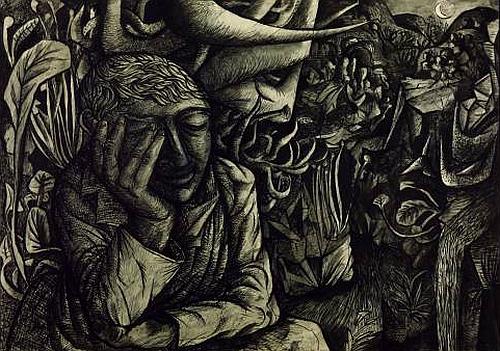
Dreamer in Landscape
1942
John Craxton
b. Oct. 3, 1922
_______________________
Attempt
Anatoliy Glants
Exquisite Corpse
Barsukov spent an evening in the city park and rising from the bench realized that he lost the thread of life - if there was one. He ceased putting his thoughts in combinations that led to the favorable outputs. And he was passing the circus building.
Along with Barsukov the stars appeared from behind the cupola. He recalled how two years ago he idolized the space above the manege - space skillfully prepared for jugglers, perforated beforehand for tricks, while up to the very top thoroughly uniform, intended for gymnastic flights and the swinging of flexible ropes in compliant air, - in other words, space liberated from flaws to which street space, the space of rooms and streetcars was doomed, not to mention space inside automobiles, perch boxes and empty economic bags.
Barsukov adored this rapid superficial flight of perception, and was unpleasantly astonished when it suddenly began to slip off. For no comprehensible reasons the objects or the combinations of objects no longer brought him former happiness, yet if it came to someone's mind to ask when all this started Barsukov without hesitation would answer. It began the day he met a woman who practiced the following: appeared out of suites in twilights of dresses, stood barefoot in a basin of water, and chewed on rabbits....(more)
_______________________

White Oak
David Leventi
_______________________
Sestina
Jane Joritz-Nakagawa
Not wanting to be an open book
We hide, like forgotten clothes, the passion
we consumed, until the house of which we recently have tired
collapses before we fully escape it. The remains of this life,
waiting like a meal, are pushed
aside for some semblance of predictable help
(....)
Who wouldn't
have known or guessed that passion would help push us through, in the face
of tired bookishness, a hazardous life....
...(more)
Arabesques Review
International Poetry & Literature Journal
The Meditations
Jane Joritz-Nakagawa New from Otoliths
_______________________
EOAGH - Issue 5
heads up from Nick Piombino
from
Nothing is in Here [pdf]
a chapbook by Andrew Levy
eoagh
The Wrong Place
Nothing is in here. So, I make it look as different as possible. Anyone who hasn’t seen it
matters in a way that may feel like it can’t be silent. It has been easy to say anything at
all for some time. For example, the encroaching humidity of mid-summer Manhattan
has taken my breath. The sky, lover of the Empire State Building, of the entirety of midtown;
I am never more satisfied than in its absence from sight. The city dips and folds in
a milky middle that has serrated the lower half from its upper. Nothing contributes
more allure to the vanilla middle of the urban interruption than it does. Nothing is
there. This nothing appears most bold. I keeping coming back for more of it distracted
by the lives of everyone around me. You’re not listening to me. Is it that I want
something that I can’t have? The Empire State Building in its absence from sight. Let’s
get in bed, tomorrow’s a big day, it’s too much. I don’t know what to say. We’re going to
pull out of the entirety of mid-town. You were never more than a middle coming back
for more. It’s unbelievable. In its absence the lower half can look vanilla. For some time
it has taken my breath in a way that feels like another urban mid-summer interrupted by
rolling brownouts. It interrupts one’s breath in a lie. Betrayal. A serrated promise. The
ruin of the Empire State Bildungsroman in which everyone and everything appears
satiated but pulling back the chairs for more. Nothing can be as silent. The books were
once read, the television watched, the movies and the films that the variety of media
entertainments have rendered inessential to my happiness. Your lower half around me
my happiness, it’s not enough. It’s too much, you’re not listening. An incomplete
entirety of them spent in bed. Your lower half. It’s too much, you’re not listening. The
city lifted from the ground, upholstered in white sky... It’s not enough. What’s that
smell? It’s unbelievable. It interrupts one’s breath by pulling back the entirety of the air.
I can’t breathe. There’s not enough air. What’s that smell? Do you smell that?
.....................................................
Charles Olson: Language as Physical Fact
A Panel, Reading, and Exhibition
eoagh
The Content Of History Will Be Poetry
Barbara Henning
If it's true as the tantrics believe that "sound, as a vibration of undifferentiated intelligence, is the catalyst that sets into motion the unfolding of the manifest cosmos" then most certainly as poets we are participating in the creation and destruction with every word we write and speak. Olson lectures to his classes at Black Mountain: "Suddenly, kosmos is history," is "mythology" is "inside a human being" is "personal experience" is "discrete and continuous" "and . . each one of us, a conceivable creator." It's easy enough. With all the circles and multiples, we just "lean in a direction which produces a result which is called success."
We begin leaning through our breath, in our body, in our place. Olson writes in "Projective Verse." "If he stays inside himself, if he is contained within his nature as he is participant in the larger force, he will be able to listen, and his hearing through himself will give him secrets objects share." Participant in the larger force. Participant in the larger field. Participant with the secrets objects share. Here I begin thinking of the Yoga Sutras, the Gita, the Upanishads. Stillness. Witness. Presence. Breathing as part of the whole breathing. Poetry as mythology as history as the story of the “I” in the larger field.
Olson had no need for the armor of a unitary, diachronic, rational history. We poets are historians. "Then he, if he chooses to speak from these roots, works in that area where nature has given him size, projective size." Whitman size. Maximus mythic Olson. If we begin here, Olson implies, many changes will occur in the poem and in the lived life. Robert Duncan in the introduction of The Special View: "I don't mean he wanted things to happen in his classes. He wanted things to happen in them spiritually. . . Charles wanted to produce a new and redeemed man. This is actually Charles' alchemy." That's clear when I re-read his essays. Even though Olson didn't wear zen loafers or formally practice yoga, he was a-leaning-into yogi-zen-poet teacher. ...(more)
_______________________
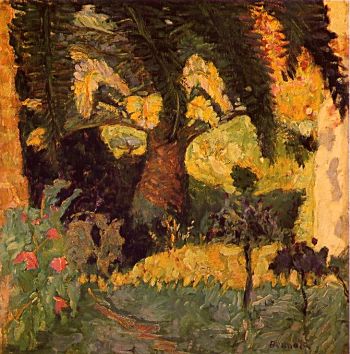
"Palmeraie au Cannet"
Pierre Bonnard
b. Oct. 3, 1867
_______________________
What Is To be Done (with Lenin)?
Slavoj Zizek
... one should risk to reintroduce the Leninist opposition of "formal" and "actual" freedom: the moment of truth in Lenin's acerbic retort to his Menshevik critics is that the truly free choice is a choice in which I do not merely choose between two or more options within a pre-given set of coordinates, but I choose to change this set of coordinates itself. The catch of the "transition" from the Really Existing Socialism to capitalism was that people never had the chance to choose the ad quem of this transition - all of a sudden, they were (almost literally) "thrown" into a new situation in which they were presented with a new set of given choices (pure liberalism, nationalist conservatism).
This is what Lenin's obsessive tirades against "formal" freedom are about, and therein resides their "rational kernel" worth saving today: when he underlines that there is no "pure" democracy, that we should always ask whom does a freedom under consideration serve and where is its role in the class struggle, his point is precisely to maintain the possibility of the true radical choice. This is what the distinction between "formal" and "actual" freedom ultimately amounts to: "formal" freedom is the freedom of choice within the coordinates of the existing power relations, while "actual" freedom designates the site of an intervention which undermines these very coordinates. In short, Lenin's point is not to limit freedom of choice, but to maintain the fundamental Choice - when Lenin asks about the role of a freedom within the class struggle, what he is asking is precisely: "Does this freedom contribute to or constrain the fundamental revolutionary Choice?"...(more)
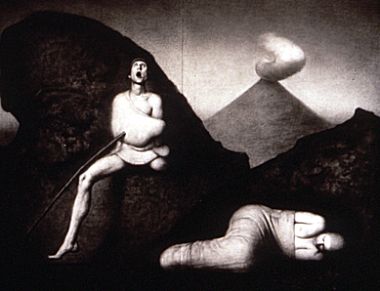
One Story Singer
Odd Nerdrum
_______________________
The Man on the Dump
Wallace Stevens
(October 2, 1879 - August 2, 1955)
(....)
One sits and beats an old tin can, lard pail.
One beats and beats for that which one believes.
That’s what one wants to get near. Could it after all
Be merely oneself, as superior as the ear
To a crow’s voice? Did the nightingale torture the ear,
Pack the heart and scratch the mind? And does the ear
Solace itself in peevish birds? Is it peace,
Is it a philosopher’s honeymoon, one finds
On the dump? Is it to sit among mattresses of the dead,
Bottles, pots, shoes and grass and murmur aptest eve:
Is it to hear the blatter of grackles and say
Invisible priest; is it to eject, to pull
The day to pieces and cry stanza my stone?
Where was it one first heard of the truth? The the.
...(more)
_______________________
Wallace Stevens’s Manuscript
As If in The Dump
Graham Foust
jacket 14
When Stevens writes that "We say ourselves in syllables that rise/ From the floor, rising in a speech we do not speak," he reads the Kantian notion of the book through Marx’s eyes, those microscopes of the potent poetry of the commodity.(...)
By forcing his manuscript to be treated as if it were in the waste basket, despite the fact that it is located in a building full of books, Stevens makes an oral issue of the moral. By making sure that his notes for "The Man with The Blue Guitar" remain at least figuratively in the dump, Stevens takes Kant’s laws of publication one step deeper into writing, one step closer to the author as person. By writing his own laws of publication and bringing them to bear on published and unpublished words, on leaves from his legal pad, the ever-keen Stevens is able to mark and demarcate the values of his ghosts and remark upon and question the materials of his trades....(more)
_______________________
Beauty is momentary in the mind --
The fitful tracing of a portal;
But in the flesh it is immortal.
-
Wallace Stevens, Peter Quince at the Clavier
_______________________
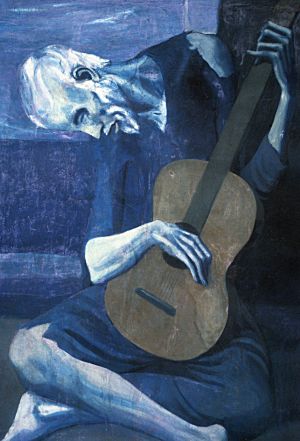
The Old Guitarist
Picasso
1903
_______________________
The Man With the Blue Guitar
Wallace Stevens
(....) XV
Is this picture of Picasso's, this "hoard
Of destructions," a picture of ourselves,
Now, an image of our society?
Do I sit, deformed, a naked egg,
Catching at Good-bye, harvest moon,
Without seeing the harvest or the moon?
Things as they are have been destroyed.
Have I? Am I a man that is dead
At a table on which the food is cold?
Is my thought a memory, not alive?
Is the spot on the floor, there, wine or blood
And whichever it may be, is it mine?
(....)
XXIV
A poem like a missal found
In the mud, a missal for that young man,
That scholar hungriest for that book,
The very book, or, less, a page
Or, at the least, a phrase, that phrase,
A hawk of life, that latined phrase:
To know; a missal for brooding-sight.
To meet that hawk's eye and to flinch
Not a the eye but at the joy of it.
I play. But this is what I think.
...(more)
_______________________
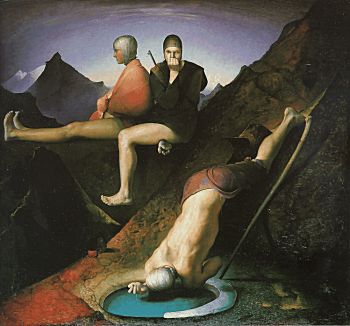
Three Namegivers
Odd Nerdrum
1 2 3
_______________________
from Company
Samuel Beckett
pith
A voice comes to one in the dark. Imagine.
To one on his back in the dark. This he can tell by the pressure on his hind parts and by how the dark changes when he shuts his eyes and again when he opens them again. Only a small part of what is said can be verified. As for example when’ he bears, You are on your back in the dark. Then he must acknowledge the truth of what is said. But by far the greater part of what is said cannot be verified. As for example when he hears, You first saw the light on such and such a day. Sometimes the two are combined as for example, You first saw the light on such and such a day and now you are on your back in the dark. A device perhaps from the incontrovertibility of the one to win credence for the other. That then is the proposition. To one on his back in the dark a voice tells of a past. With occasional allusion to a present and more rarely to a future as for example, You will end as you now are. And in another dark or in the same another devising it all for company. Quick leave him.
Use of the second person marks the voice. That of the third that cankerous other. Could he speak to and of whom the voice speaks there would be a first. But he cannot. He shall not. You cannot. You shall not.(....)
If the voice is not speaking to him it must be speaking to another. So with what reason remains he reasons. To another of that other. Or of him. Or of another still. To another of that other or of him or of another still. To one on his back in the dark in any case. Of one on his back in the dark whether the same or another. So with what reason remains he reasons and reasons ill. For were the voice speaking not to him but to another then it must be of that other it is speaking and not of him or of another still. Since it speaks in the second person. Were it not of him to whom it is speaking speaking but of another it would not speak in the second person but in the third. For example, He first saw the light on such and such a day and now he I is on his back in the dark. It is clear therefore that if it is not to him the voice is, speaking but to another it is not of him either but of that other and none other to that other. So with what reason remains he reasons ill. In order to be company he must display a certain mental activity. But it need not be of a high order. Indeed it might be argued the lower the better. Up to a point. The lower the order of mental activity the better the company. Up to a point....(more)
Nohow On: Company, Ill Seen Ill Said, Worstward Ho: Three Novels
Samuel Beckett amazon link
_______________________
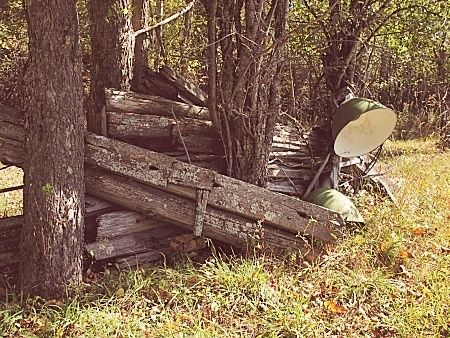
photo - mw
_______________________
The Tragedy of Narcissus The Comedy of Silver
Mahmoud Darwish
Translated from the Arabic by Fady Joudah
Words Without Borders
They never went and never arrived; their hearts are almond seeds in the streets. The plazas were more spacious than a sky that couldn’t cover them. The sea used to forget them. And they used to know their north and south, send the pigeons of memory to their first towers, and hunt, out of their martyrs, stars that march them to the beast of childhood. Whenever they said: We arrived . . . the first of them fell at the arch of beginning: O hero, stay far from us so we can walk in you toward another ending, the beginning is damned. Hero, bloodied with long beginnings, tell us: how many times will our journey be the beginning? Shrouded hero, above wheat bread and almond wool, we will mummify the wound that absorbs your soul: with dew; with a sleepless night’s milk; with the lemon blossom and the bloodied stone; with anthem—our anthem; with a feather plucked from the phoenix—
And land, like language, is inherited!
Their anthem is a stone scratching the sun.
They were kind and full of satire and
didn’t know dancing or the mizmar
except in the funerals of immigrant friends.
They used to love women the way they loved fruit and cats and principles.
They used to count the years by the ages of their dead, and migrate
to their obsessions: What did we do with the carnation to become its distance?
What did we make of the seagulls to become the residents
of wharves and of the saltiness of dry air: welcoming as we bid farewell?
They used to be the proclivity of each river not looking for a constant.
They used to dash in life hoping for a path that saves them from scattering . . .
and because they knew from life only life as it gave
itself, they didn’t ask what is after their fates and their graves.
And why should they be concerned with Resurrection?
Why should they care whether Ishmael or Isaac was a ram to the Lord?
This hell is the Hell. They became used to planting their mint in their shirts
and learned to plant lablab ivy around their tents; used
to memorizing the violets in their songs and in the flower pots of their dead . .(....)...(more)
Excerpted from If I Were Another by Mahmoud Darwish, translated from the Arabic by Fady Joudah, to be published in November by Farrar, Straus and Giroux, LLC.
_______________________
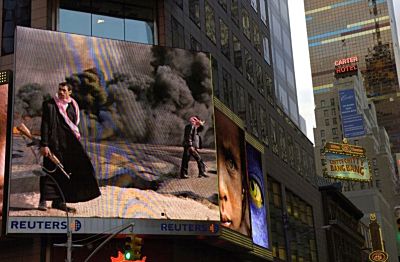
Times Square
2008
Roemer van Toorn
_______________________
..fictive things
Wink as they will. Wink most when widows wince.
-
- Wallace Stevens - A High-Toned Old Christian Woman
_______________________
Happy third birthday Hiding in Plain Sight
_______________________
MediaCommons Press
an in-development feature of MediaCommons, promoting the digital publication of texts ranging from article- to monograph-length.
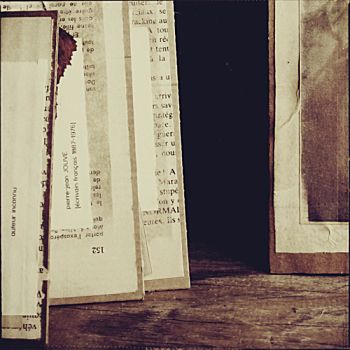
les brumes
flickr
_______________________
Transcending Words
Concerning
Word-Erasing
Emmanuel Lévinas
Translated by Didier Maleuvre
Yale French Studies, No. 81, On Leiris. (1992)
The presence of the Other is a teaching presence. That is why the word as teaching is more than the experience of the real, why also the master does more than mind midwifery. Indeed it tears the experience away from its aesthetic complacency, from its position here where it peacefully lies. It transforms it into a being by calling upon it. In this sense, we might have once said that criticism-as a living being speaking to another living being-brings back the image where art delights, to the genuinely real being. The language of criticism pulls us out of that dreaming which also harbors artistic language.
Of course, in its written form, it continually calls for more criticism; books keep calling for more books. Yet the proliferation of the printed word stops or reaches its highest point when the living word comes into it, at the moment, again, when criticism blossoms into teaching.
The privilege which the living word, made the ear, has over the image-word or the already picturesque sign also appears when the act of speaking is considered.
For is speaking only putting words into signs as the writings suggest? Disfigured words, "paroles gelees" [frozen words] where language is already turned into documents and vestiges. The living word fights against thought turning into remains, it fights against words coming out when there is no one to listen to them. Oral expression entails the impossibility of being in itself, of keeping its thought to itself. It consequently involves a lack in the position of the subject in which the "I" enjoys a given world. Speaking means interrupting my existence as both subject and master, yet without exposing me since it leaves me as simultaneously subject and object. My voice brings the context in which that dialectical configuration is concretely carried out. The speaking subject does not set up the world in relation to himlherself and does not position himlherself just simply in the midst of hislher self-representation as does the artist; the speaking subject does it in relation to the Other. This privilege of the Other can be understood as soon as we admit that the foremost fact of life is neither the in-itself nor the for-itselfbut the "pourl'autre" [for the other]; or, again, as soon as human existence becomes being. Through the spoken word, the subject who posits himself also exposes himself and, in a sense, prays.
According to the foregoing comments, indeed too cursory for so serious a subject, the very moment of expression becomes located outside of its traditional subordination to thought. The common idea according to which words are only good for communicating-or concealing- thought, relies on such an ancient and venerable tradition that no one dares challenge it. It is our supposition that Michel Leiris's word-erasing magnificently exhausts all the possibilities of developing and furthering thinking thought when the latter touches upon the sensory matter that molds words. Yet, those possibilities still rely on the privilege given to thought as it is expressed in the age-old language of "whatever can be properly thought out" ("Ce qui se conqoit bien . . . "). Available as part of a package of Emmanuel Levinas Essay aaaarg_______________________
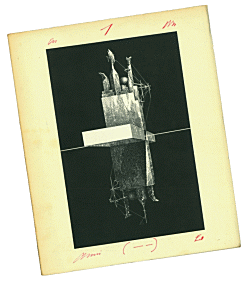
The Vagrant Light Of Stars
Lebbeus Woods presents his project
Einstein Tomb
1980
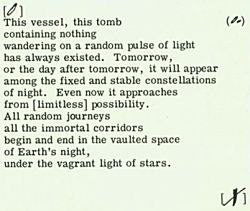
_______________________
"The children of the '68ers are now of age. And they are writing."
The Spirit of NihilismAlexander R. Galloway reviews Mehdi Belhaj Kacem's L'esprit du nihilisme: Une ontologique de l'Histoirectheory
MBK's new book, L'esprit du nihilisme: Une ontologique de l'Histoire [The Spirit of Nihilism: An Ontologic of History] (Paris: Fayard, 2009), appears in Badiou's book series, the same venerable collection formerly housed at Seuil and coedited by Barbara Cassin, the well-known classicist. L'esprit du nihilisme seems to be MBK's attempt to write a so-called great work of philosophy -- to write his own Being and Event, his own Phenomenology of Spirit, his own Broken Hegemonies. With several books published already, L'esprit du nihilisme was to be MBK's explication of a true philosophical system. Though if it fails to achieve such lofty heights, L'esprit du nihilisme nevertheless contains a fabulous consolation prize: an intriguing series of philosophical provocations that will disrupt continental philosophy, a discourse experiencing dramatic reorganization in the wake of "the failure of theory." ...(more)
_______________________
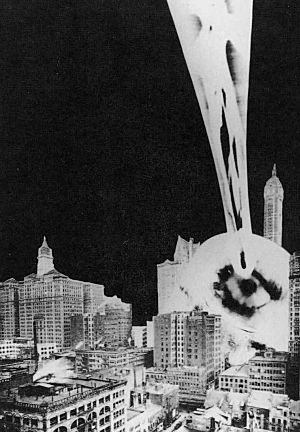
The Disconcerting Light
E.L.T. Mesens 1926 E.L.T. Mesens - Dada Joker in the Surrealist Pack
Neil Matheson
Image [&] Narrative
_______________________
What Have We Done to Democracy?
Arundhati Roy
The question here, really, is what have we done to democracy? What have we turned it into? What happens once democracy has been used up? When it has been hollowed out and emptied of meaning? What happens when each of its institutions has metastasized into something dangerous? What happens now that democracy and the free market have fused into a single predatory organism with a thin, constricted imagination that revolves almost entirely around the idea of maximizing profit?
Is it possible to reverse this process? Can something that has mutated go back to being what it used to be? What we need today, for the sake of the survival of this planet, is long-term vision. Can governments whose very survival depends on immediate, extractive, short-term gain provide this? Could it be that democracy, the sacred answer to our short-term hopes and prayers, the protector of our individual freedoms and nurturer of our avaricious dreams, will turn out to be the endgame for the human race? Could it be that democracy is such a hit with modern humans precisely because it mirrors our greatest folly--our nearsightedness?
Our inability to live entirely in the present (like most animals do), combined with our inability to see very far into the future, makes us strange in-between creatures, neither beast nor prophet. Our amazing intelligence seems to have outstripped our instinct for survival. We plunder the earth hoping that accumulating material surplus will make up for the profound, unfathomable thing that we have lost. It would be conceit to pretend I have the answers to any of these questions. But it does look as if the beacon could be failing and democracy can perhaps no longer be relied upon to deliver the justice and stability we once dreamed it would. ...(more)
_______________________
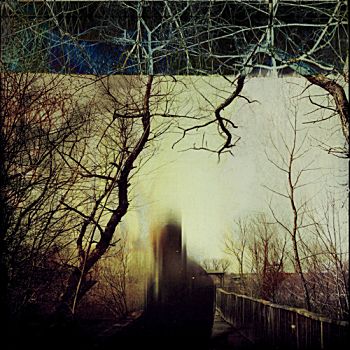
la forêt désenchantée
les brumes
flickr via la main gauche
_______________________
Poem In October
Dylan Thomas
It was my thirtieth year to heaven
Woke to my hearing from harbour and neighbour wood
And the mussel pooled and the heron
Priested shore
The morning beckon
With water praying and call of seagull and rook
And the knock of sailing boats on the webbed wall
Myself to set foot
That second
In the still sleeping town and set forth.
My birthday began with the water-
Birds and the birds of the winged trees flying my name
Above the farms and the white horses
And I rose
In a rainy autumn
And walked abroad in shower of all my days
High tide and the heron dived when I took the road
Over the border
And the gates
Of the town closed as the town awoke.
A springful of larks in a rolling
Cloud and the roadside bushes brimming with whistling
Blackbirds and the sun of October
Summery
On the hill's shoulder,
Here were fond climates and sweet singers suddenly
Come in the morning where I wandered and listened
To the rain wringing
Wind blow cold
In the wood faraway under me.
Pale rain over the dwindling harbour
And over the sea wet church the size of a snail
With its horns through mist and the castle
Brown as owls
But all the gardens
Of spring and summer were blooming in the tall tales
Beyond the border and under the lark full cloud.
There could I marvel
My birthday
Away but the weather turned around.
It turned away from the blithe country
And down the other air and the blue altered sky
Streamed again a wonder of summer
With apples
Pears and red currants
And I saw in the turning so clearly a child's
Forgotten mornings when he walked with his mother
Through the parables
Of sunlight
And the legends of the green chapels
And the twice told fields of infancy
That his tears burned my cheeks and his heart moved in mine.
These were the woods the river and the sea
Where a boy
In the listening
Summertime of the dead whispered the truth of his joy
To the trees and the stones and the fish in the tide.
And the mystery
Sang alive
Still in the water and singing birds.
And there could I marvel my birthday
Away but the weather turned around. And the true
Joy of the long dead child sang burning
In the sun.
It was my thirtieth
Year to heaven stood there then in the summer noon
Though the town below lay leaved with October blood.
O may my heart's truth
Still be sung
On this high hill in a year's turning.
|
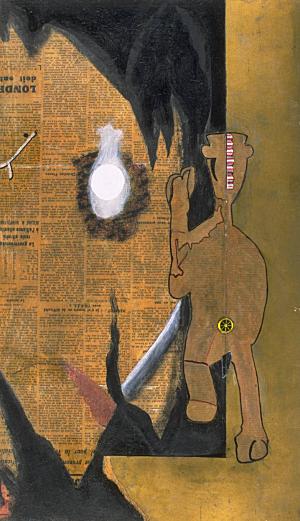
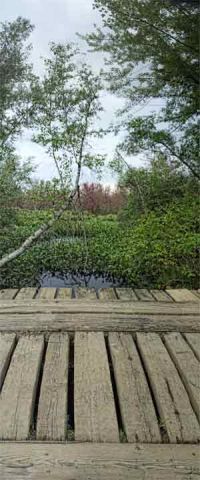
 Janus Head
Janus Head

 The Age of Briggs & Stratton
The Age of Briggs & Stratton
























































